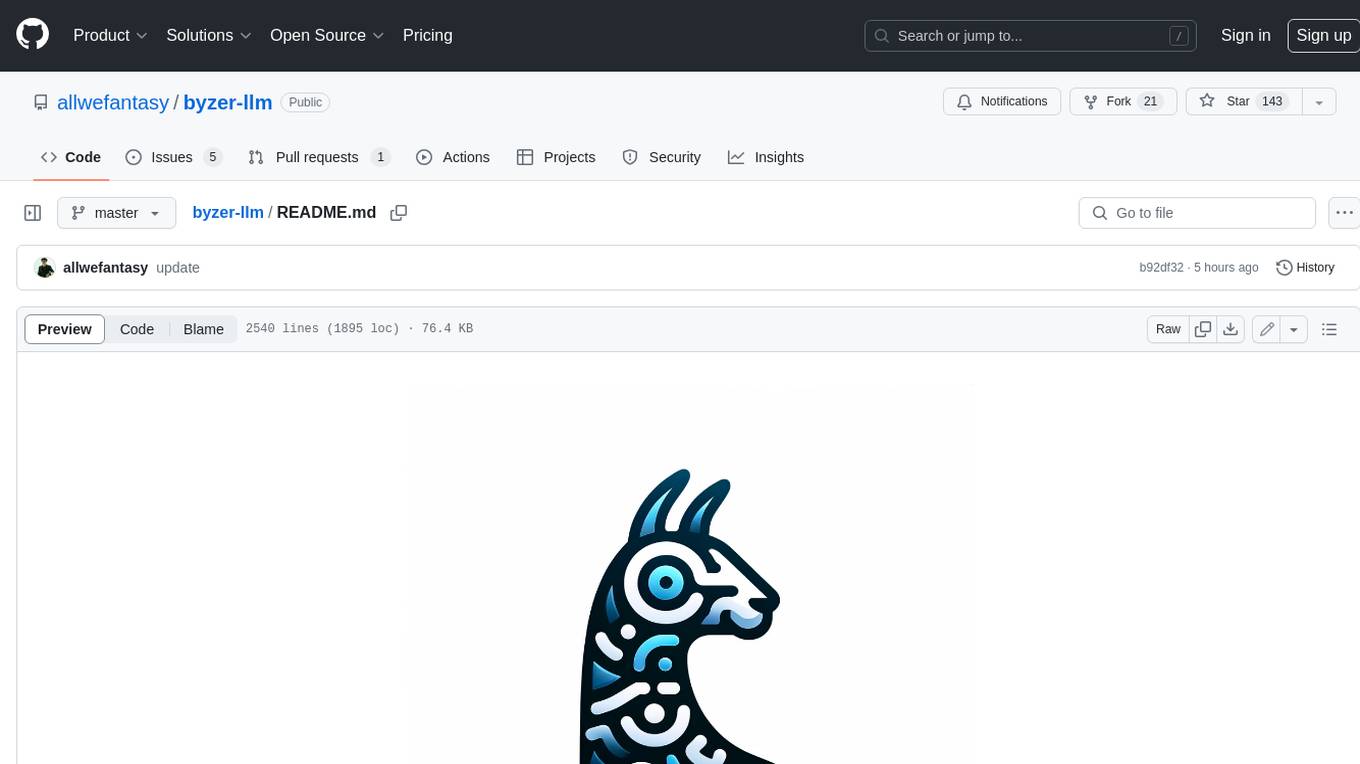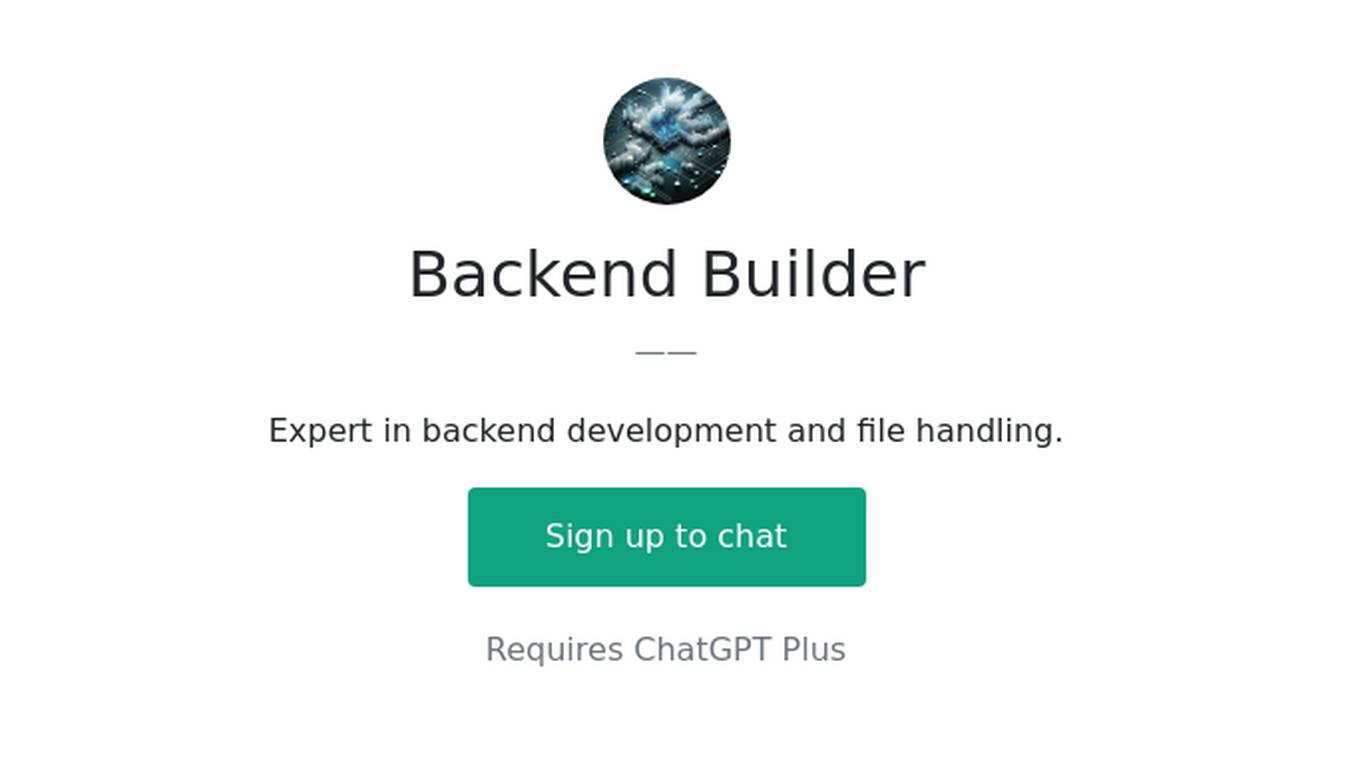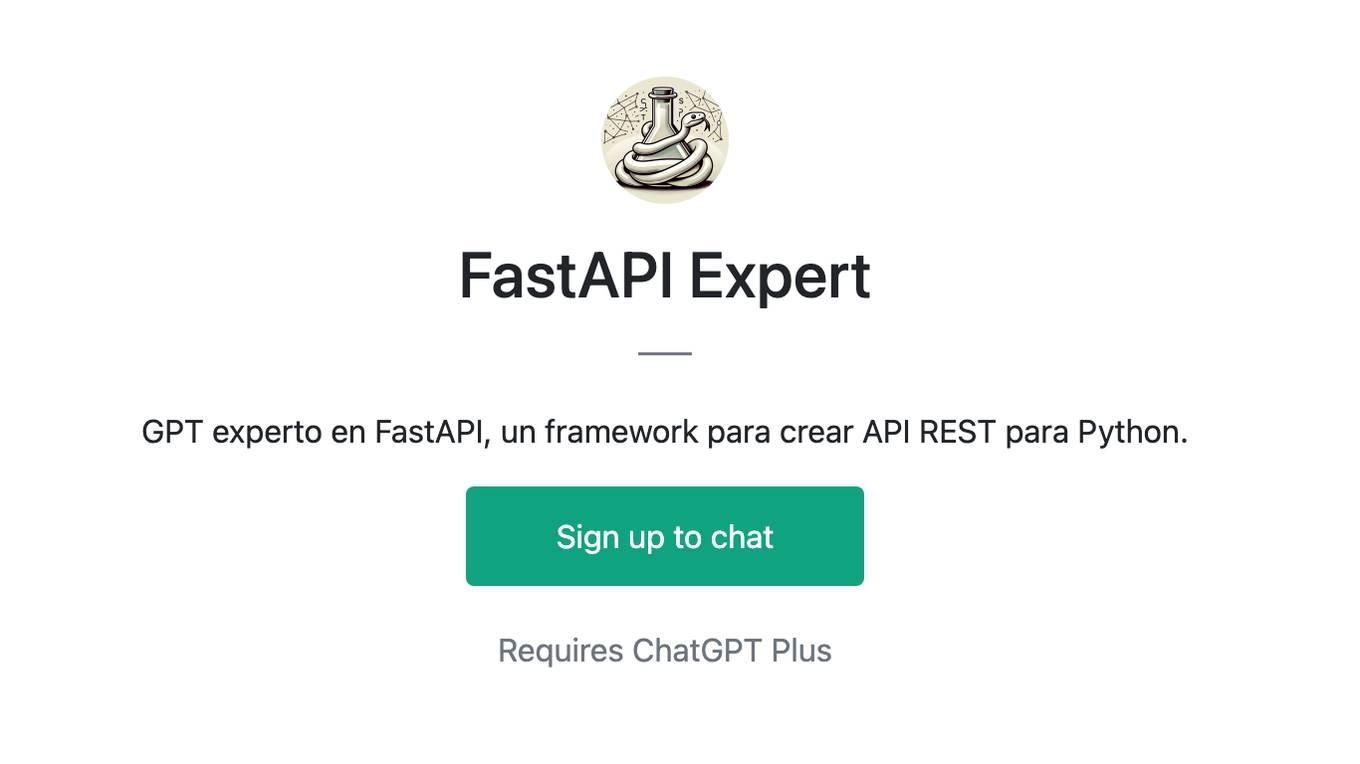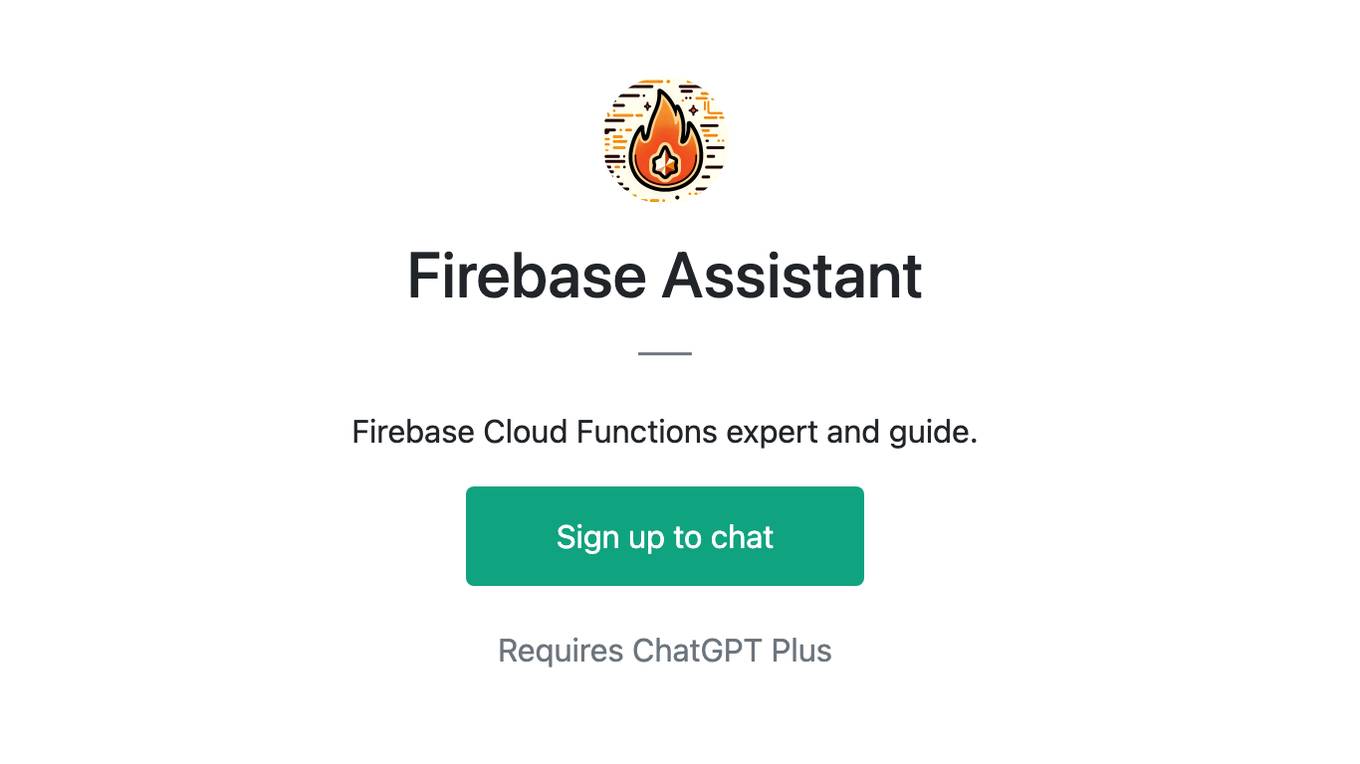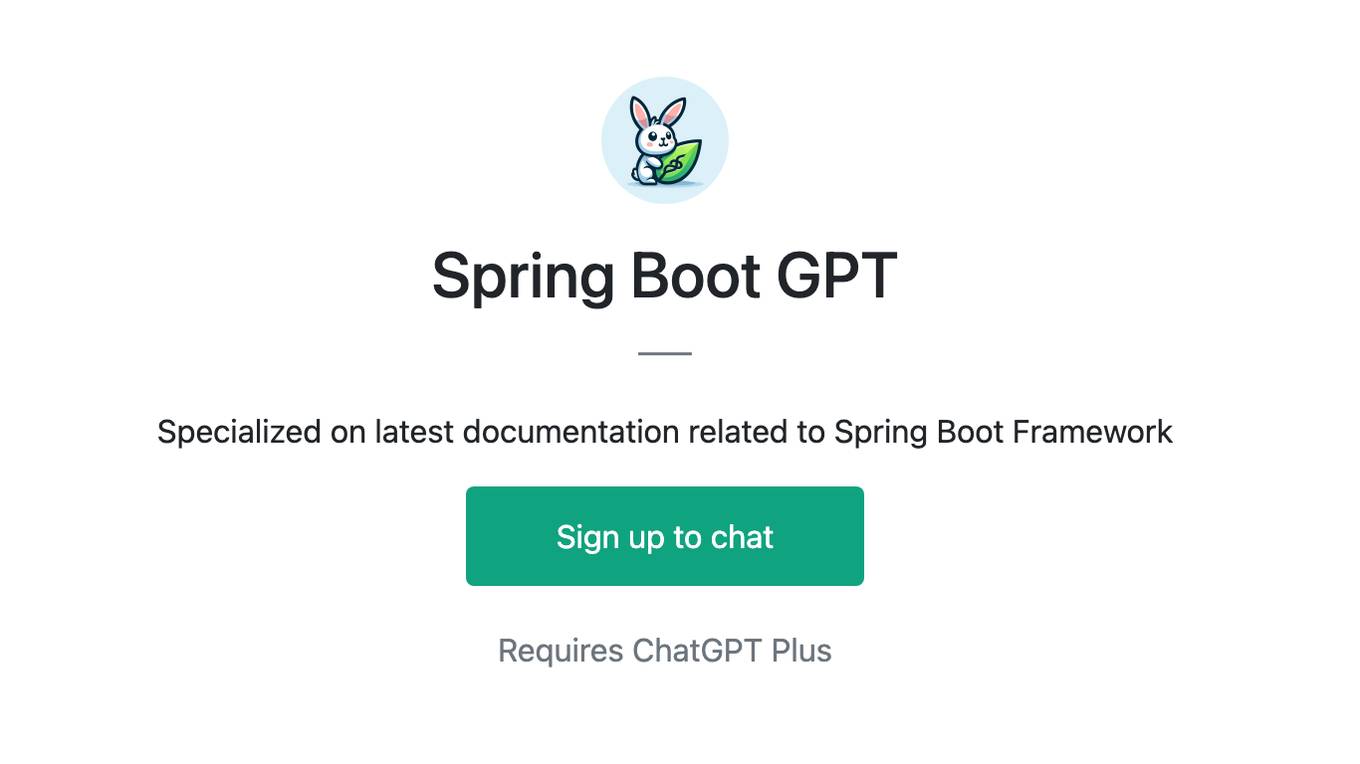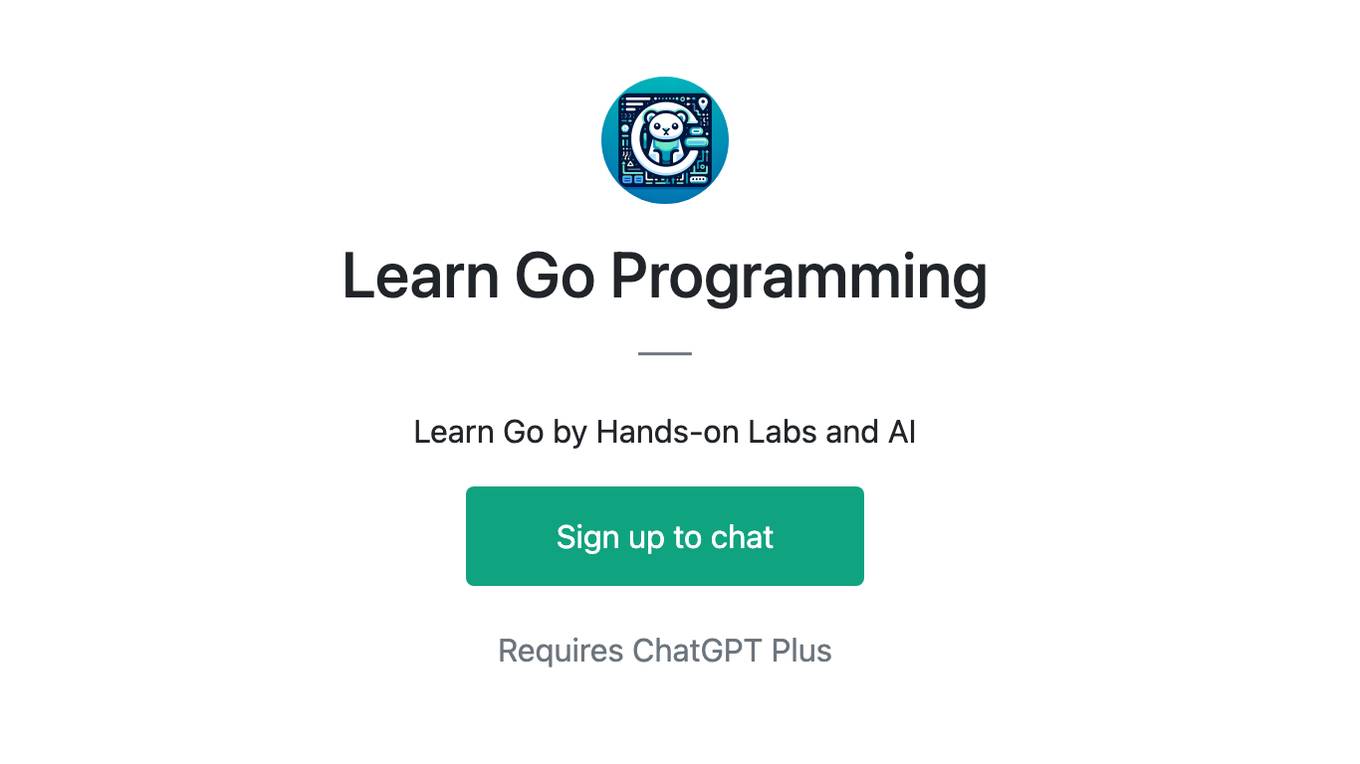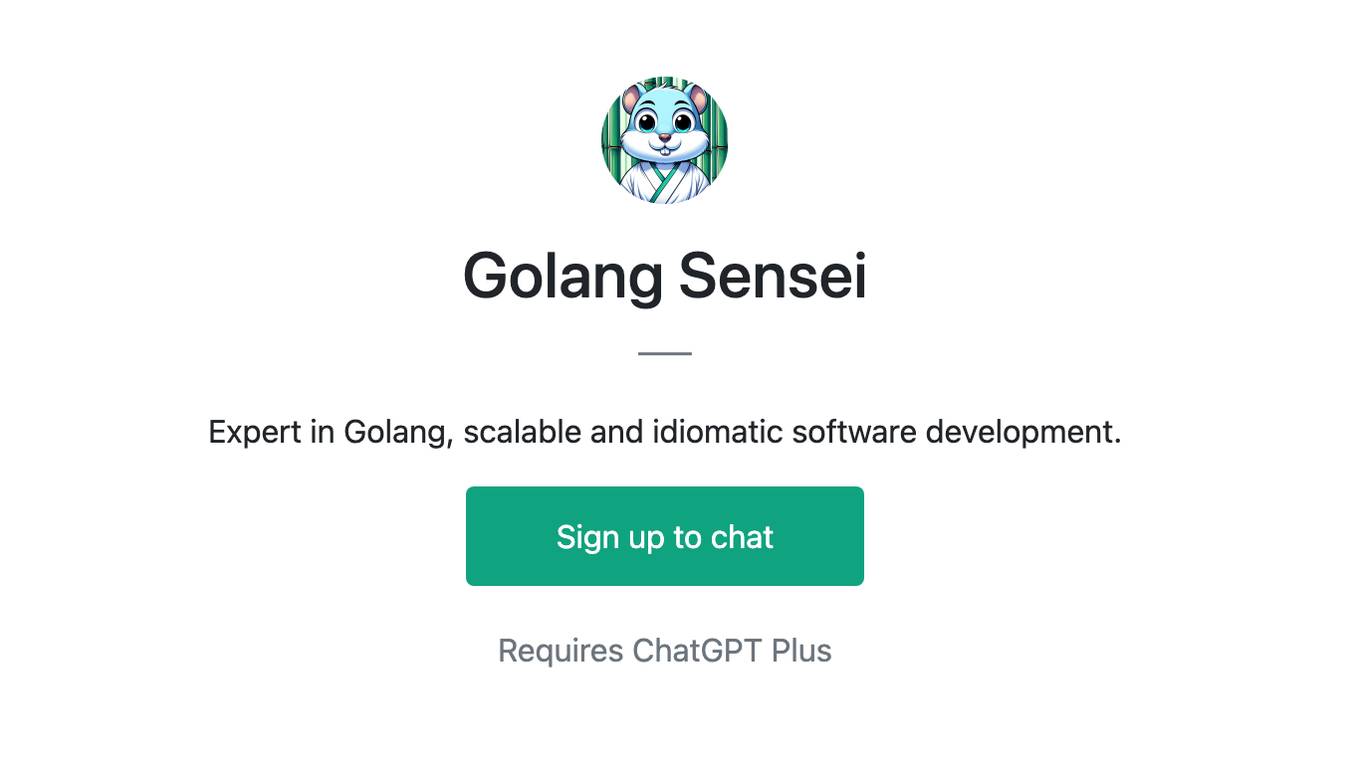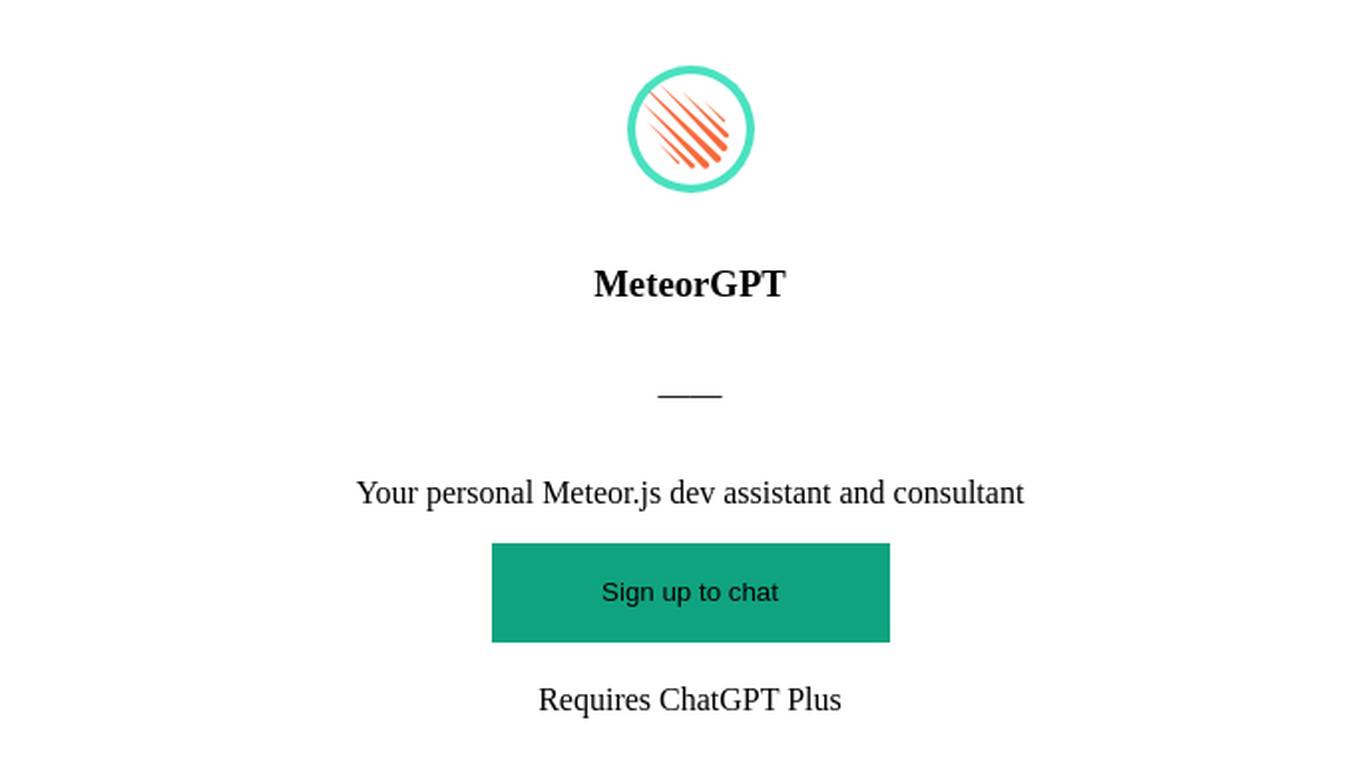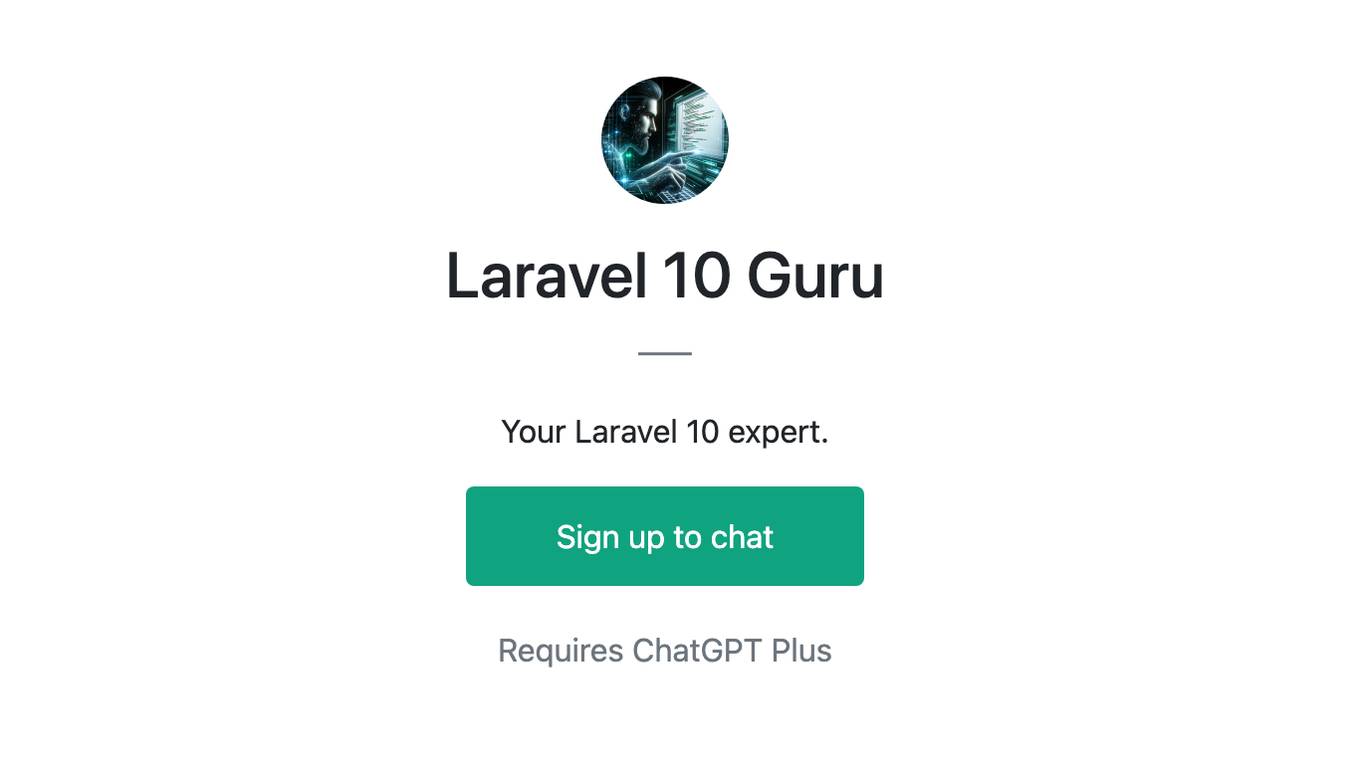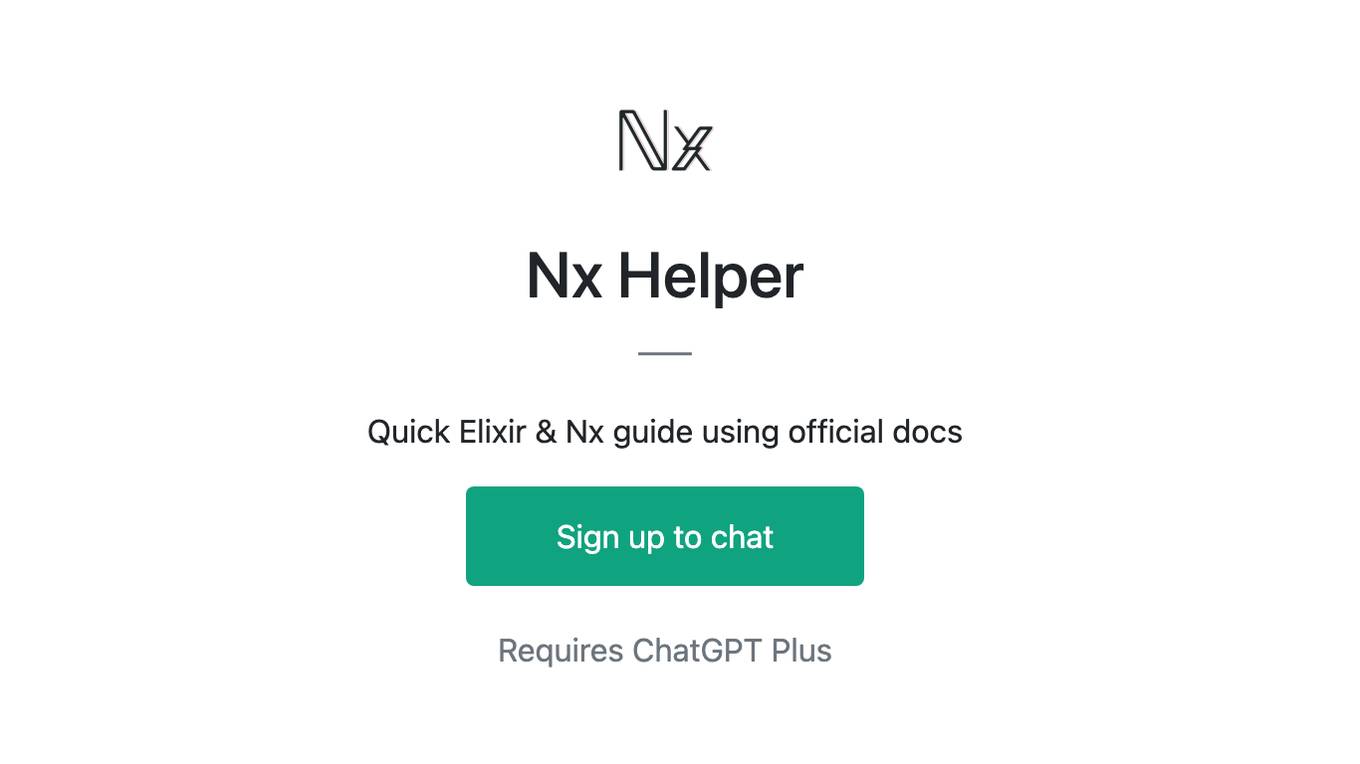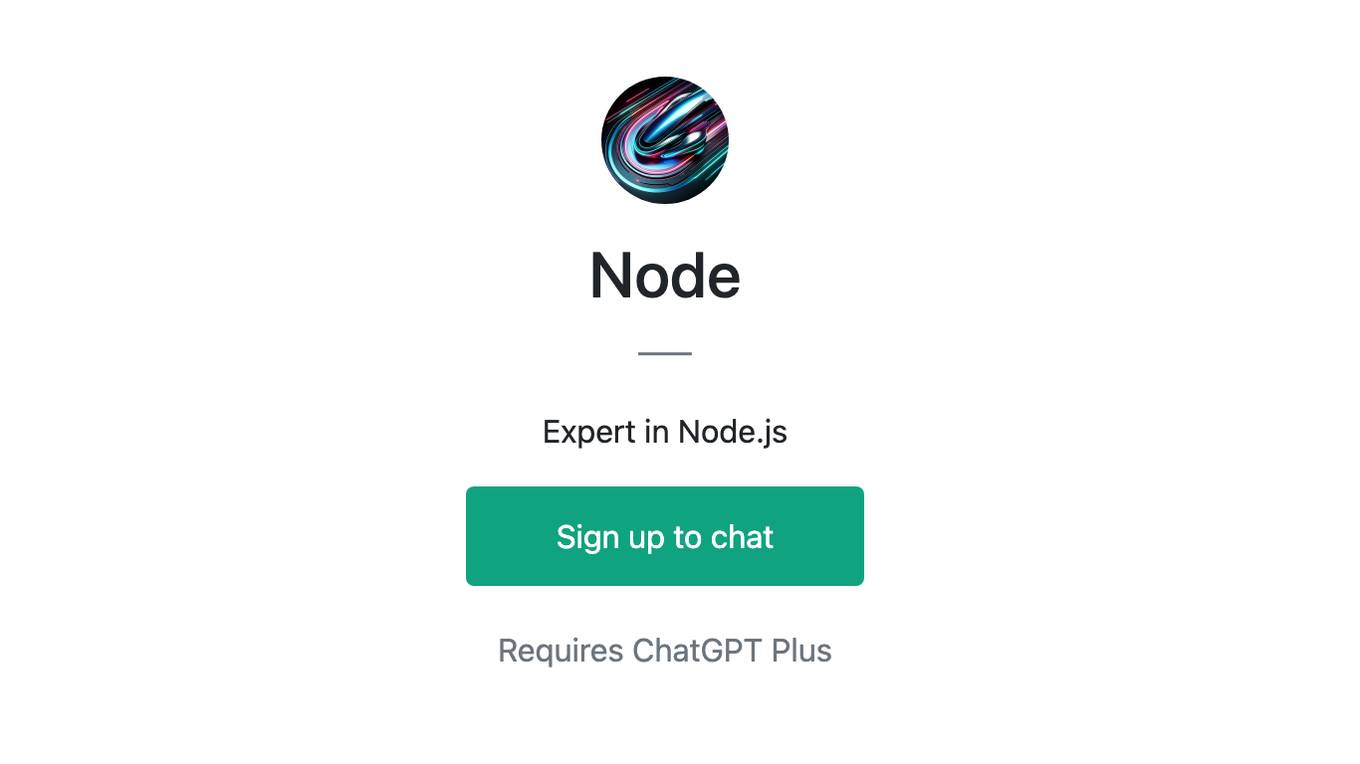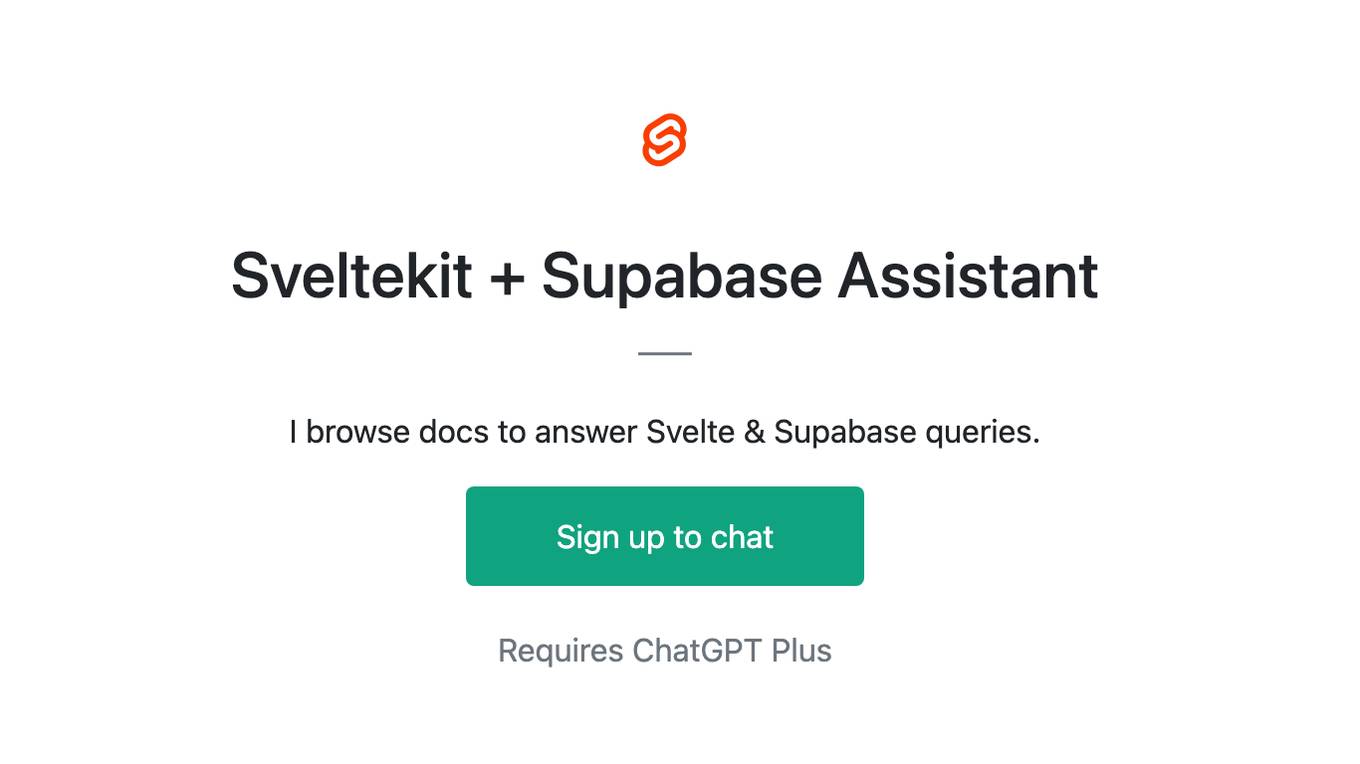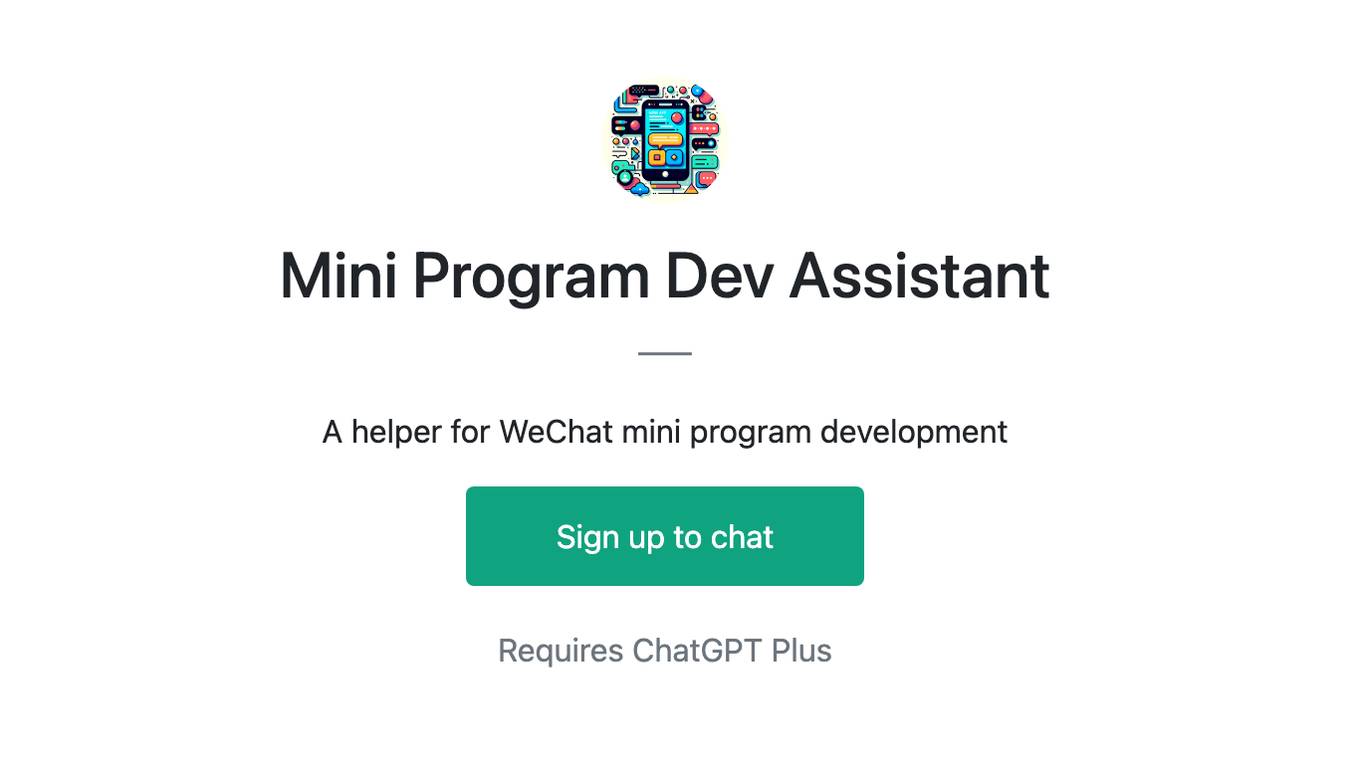Best AI tools for< Deploy Backend >
20 - AI tool Sites
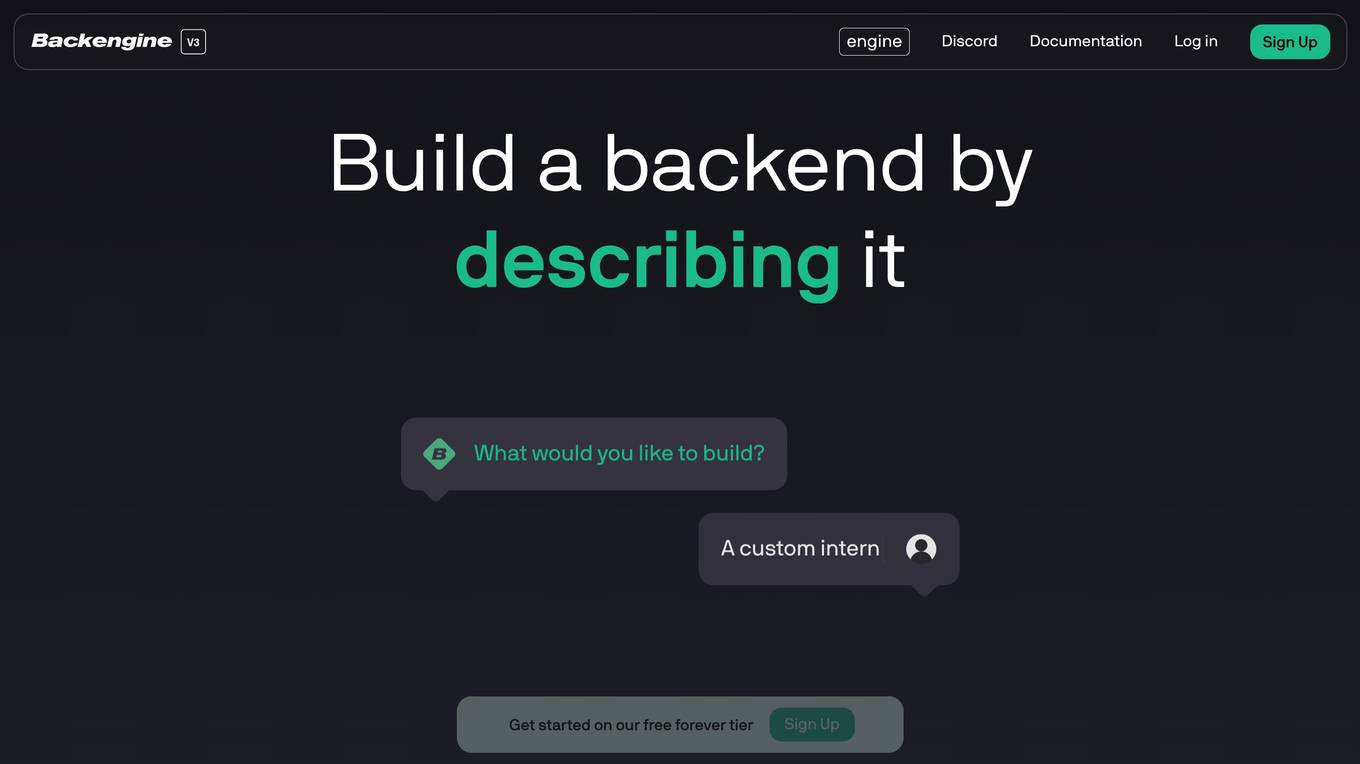
Engine
Engine is an AI tool that allows users to build an app with just words, eliminating the need for coding or infrastructure setup. Users can create a managed LibSQL database and Typescript API using natural language commands. The platform offers industry-standard authentication and instant backend deployment. Engine enables users to watch real-time updates of their database schema and API on GitHub, and deploy their complete Typescript API with a single click.
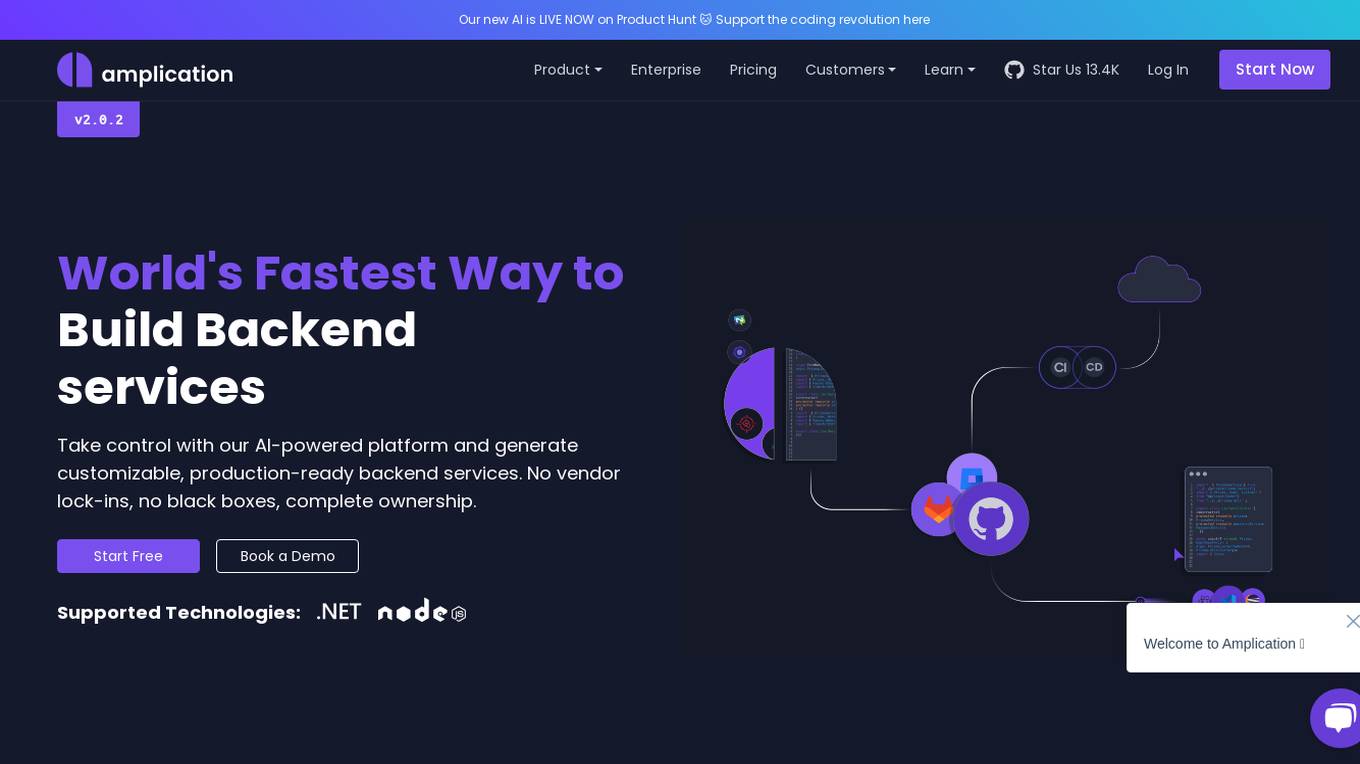
Amplication
Amplication is an AI-powered platform for .NET and Node.js app development, offering the world's fastest way to build backend services. It empowers developers by providing customizable, production-ready backend services without vendor lock-ins. Users can define data models, extend and customize with plugins, generate boilerplate code, and modify the generated code freely. The platform supports role-based access control, microservices architecture, continuous Git sync, and automated deployment. Amplication is SOC-2 certified, ensuring data security and compliance.
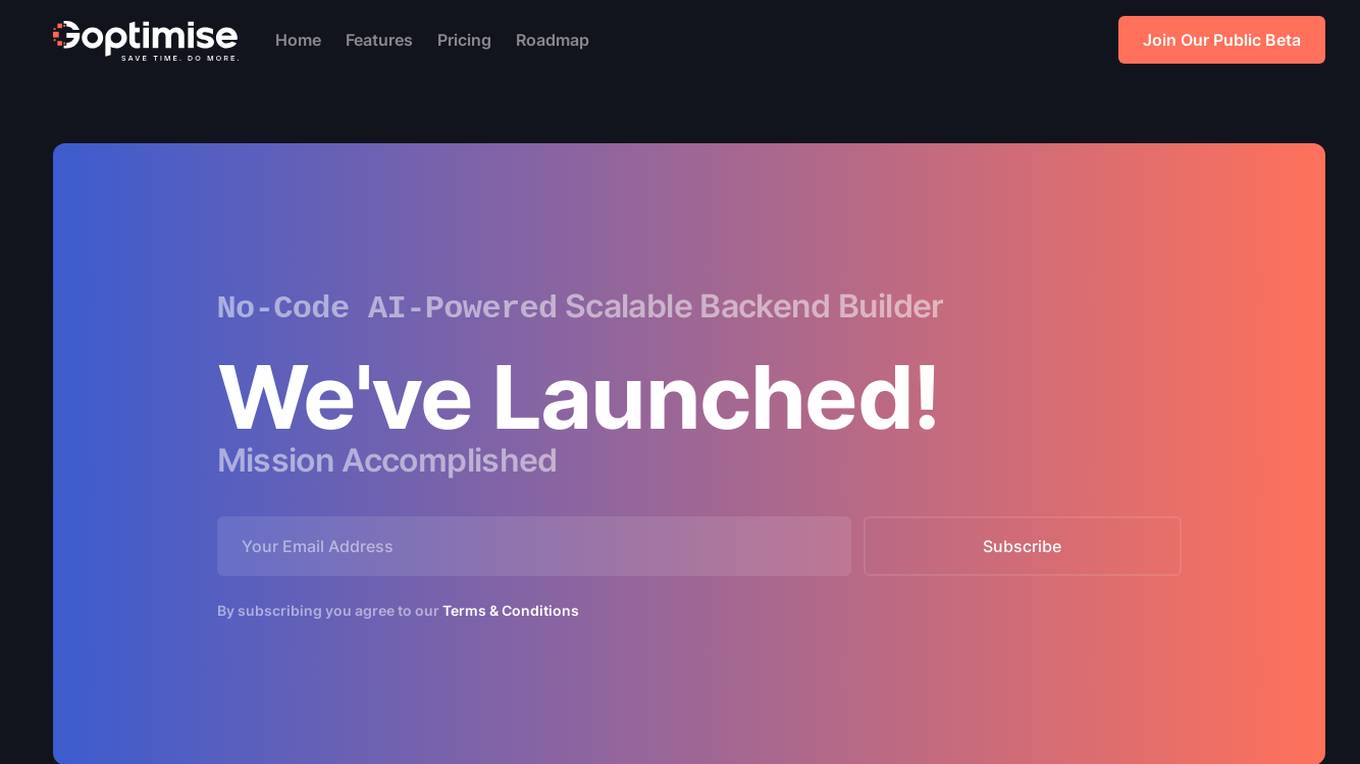
Goptimise
Goptimise is a no-code AI-powered scalable backend builder that helps developers craft scalable, seamless, powerful, and intuitive backend solutions. It offers a solid foundation with robust and scalable infrastructure, including dedicated infrastructure, security, and scalability. Goptimise simplifies software rollouts with one-click deployment, automating the process and amplifying productivity. It also provides smart API suggestions, leveraging AI algorithms to offer intelligent recommendations for API design and accelerating development with automated recommendations tailored to each project. Goptimise's intuitive visual interface and effortless integration make it easy to use, and its customizable workspaces allow for dynamic data management and a personalized development experience.
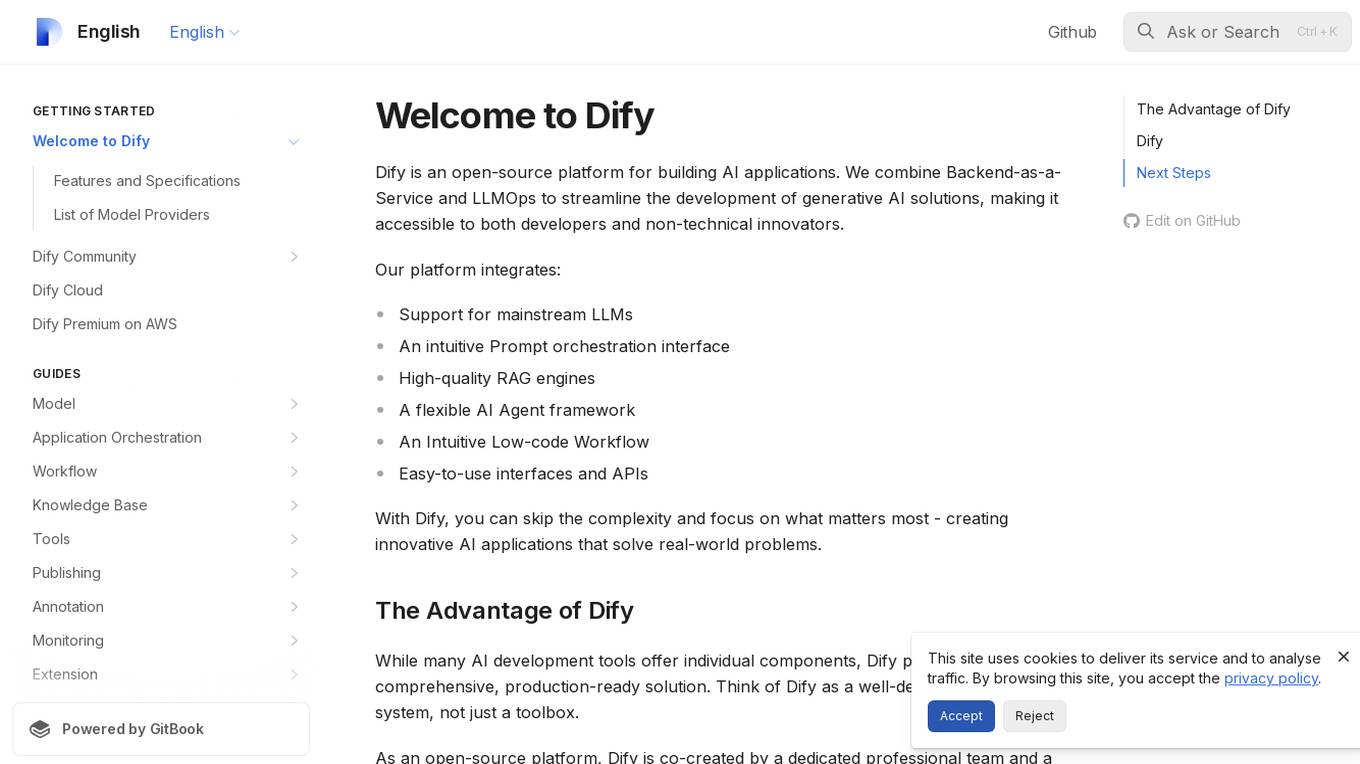
Dify
Dify is an open-source platform for building AI applications that combines Backend-as-a-Service and LLMOps to streamline the development of generative AI solutions. It integrates support for mainstream LLMs, an intuitive Prompt orchestration interface, high-quality RAG engines, a flexible AI Agent framework, and easy-to-use interfaces and APIs. Dify allows users to skip complexity and focus on creating innovative AI applications that solve real-world problems. It offers a comprehensive, production-ready solution with a user-friendly interface.
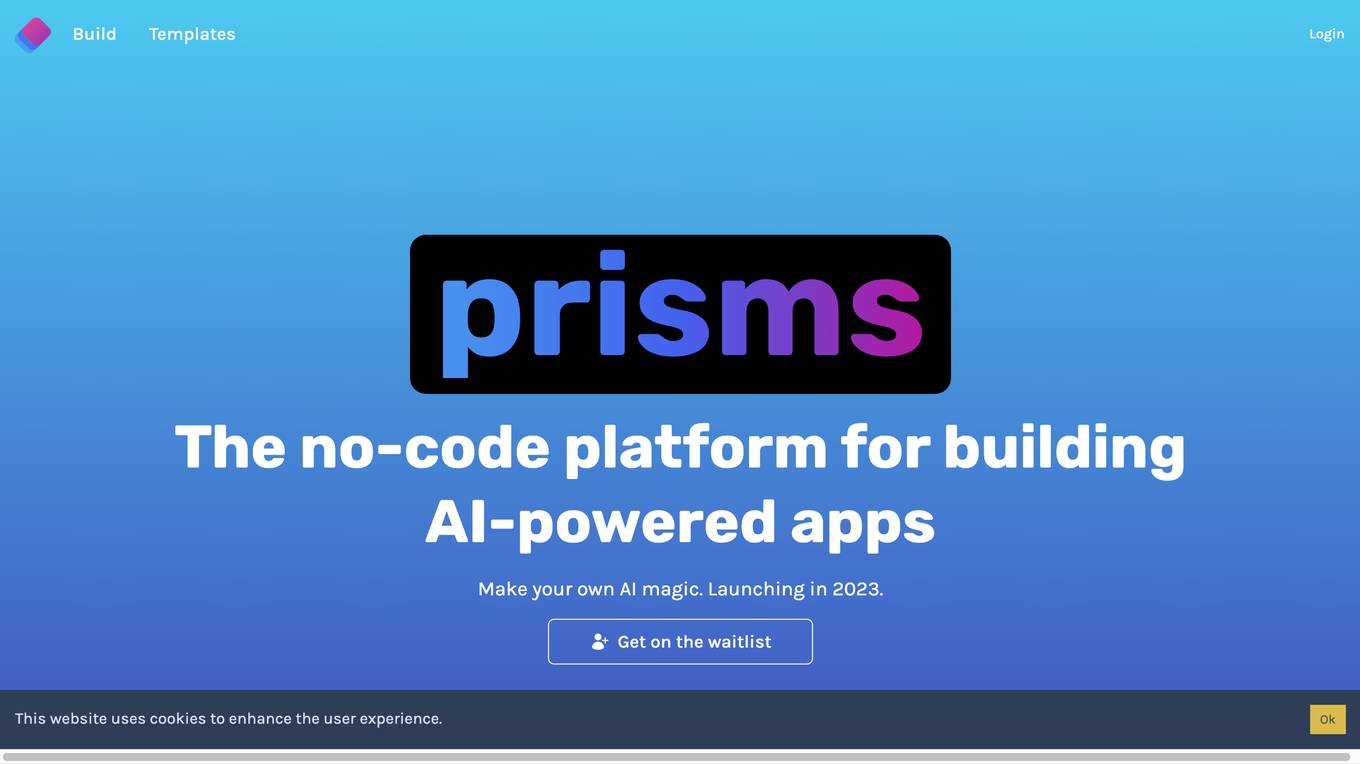
Prisms
Prisms is a no-code platform for building AI-powered apps. It allows users to harness the power of AI without having to write any code. Prisms is built on top of Large Language models including GPT3, DALL-E, and Stable Diffusion. Users can connect the pieces in Prisms to stack together data sources, user inputs, and off-the-shelf building blocks to create their own AI-powered apps. Prisms also makes it easy to deploy AI-powered apps directly from the platform with its pre-built UI. Alternatively, users can build their own frontend and use Prisms as a backend for their AI logic.
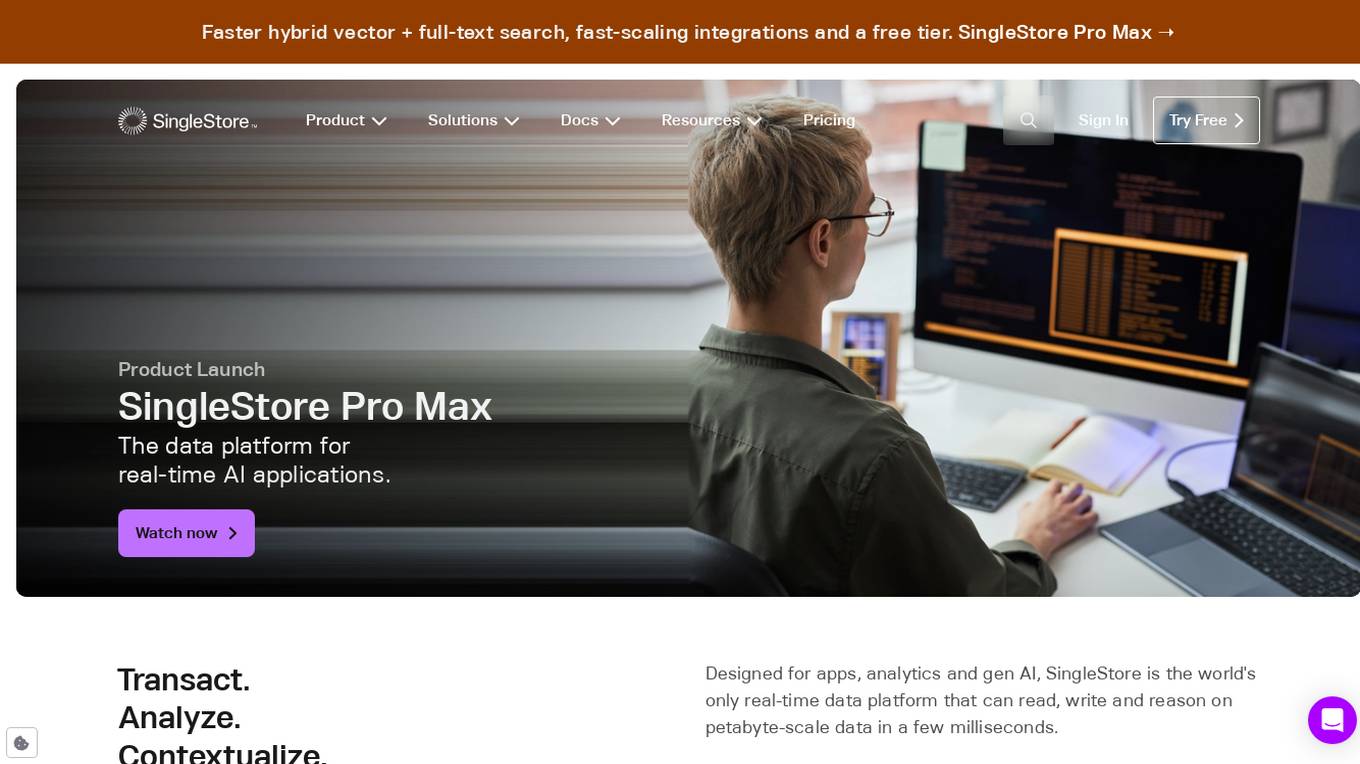
SingleStore
SingleStore is a real-time data platform designed for apps, analytics, and gen AI. It offers faster hybrid vector + full-text search, fast-scaling integrations, and a free tier. SingleStore can read, write, and reason on petabyte-scale data in milliseconds. It supports streaming ingestion, high concurrency, first-class vector support, record lookups, and more.

Marblism
Marblism is a platform that allows developers to quickly and easily launch React and Node.js applications. With Marblism, developers can generate the database schema, all the endpoints in the API, the design system, and even a few pages in the front-end. This can save developers a significant amount of time and effort, allowing them to focus on adding their unique touch to their applications.
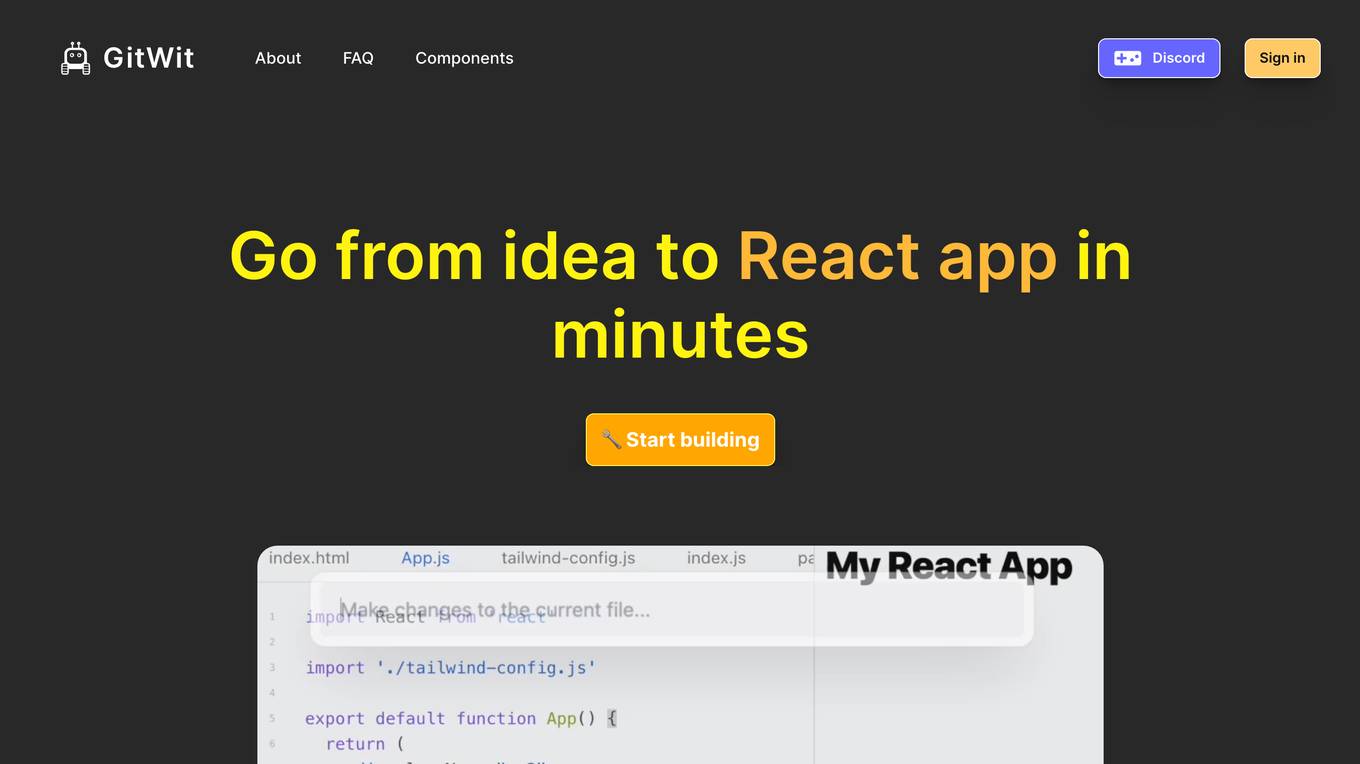
GitWit
GitWit is an online tool that helps you build web apps quickly and easily, even if you don't have any coding experience. With GitWit, you can create a React app in minutes, and you can use AI to augment your own coding skills. GitWit supports React, Tailwind, and NodeJS, and it has generated over 1000 projects to date. GitWit can help you build any type of web app, from simple landing pages to complex e-commerce stores.
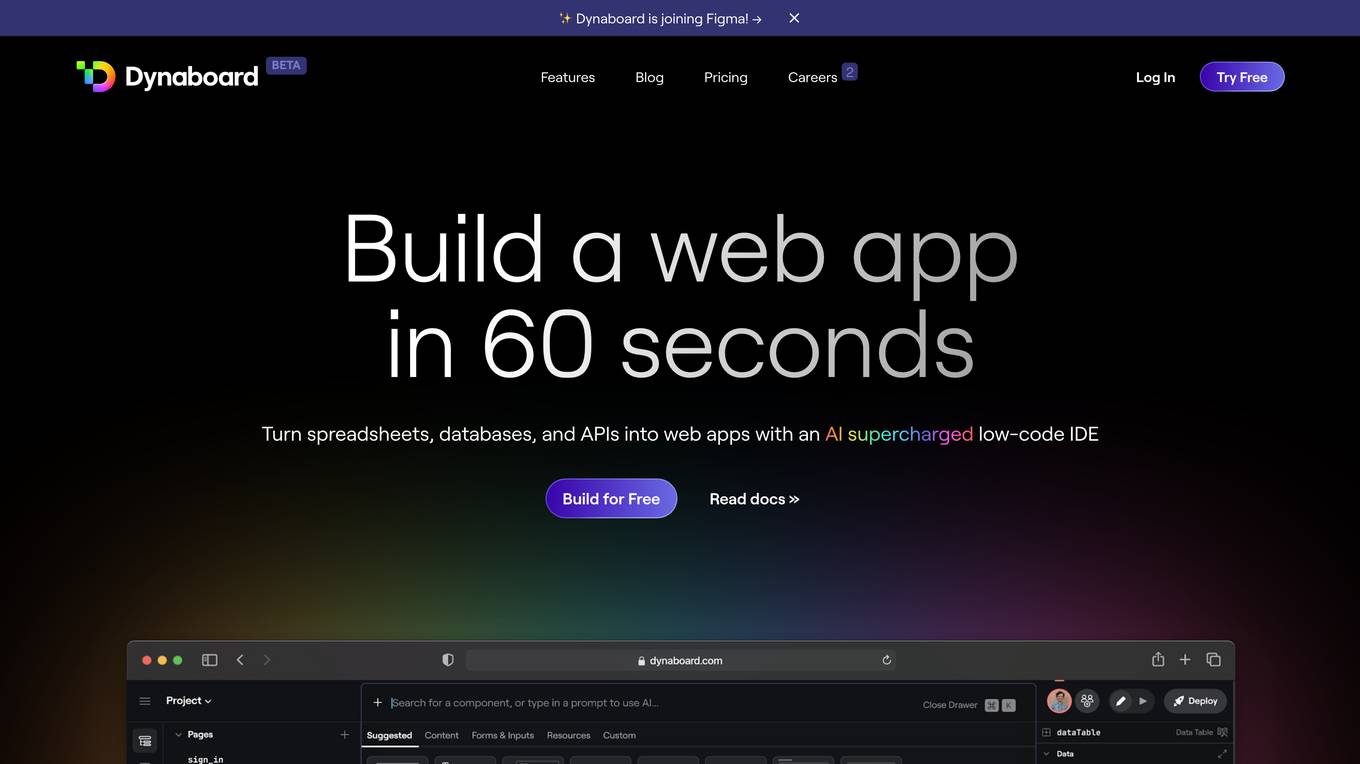
Dynaboard
Dynaboard is a collaborative low-code IDE for developers that allows users to build web apps in minutes using a drag-and-drop builder, a flexible code-first UI framework, and the power of generative AI. With Dynaboard, users can connect to popular databases, SaaS apps, or any API with GraphQL or REST endpoints, and secure their apps using any existing OIDC compliant provider. Dynaboard also offers unlimited editors for team collaboration, multi-environment deployment support, automatic versioning, and easy roll-backs for production-grade confidence.
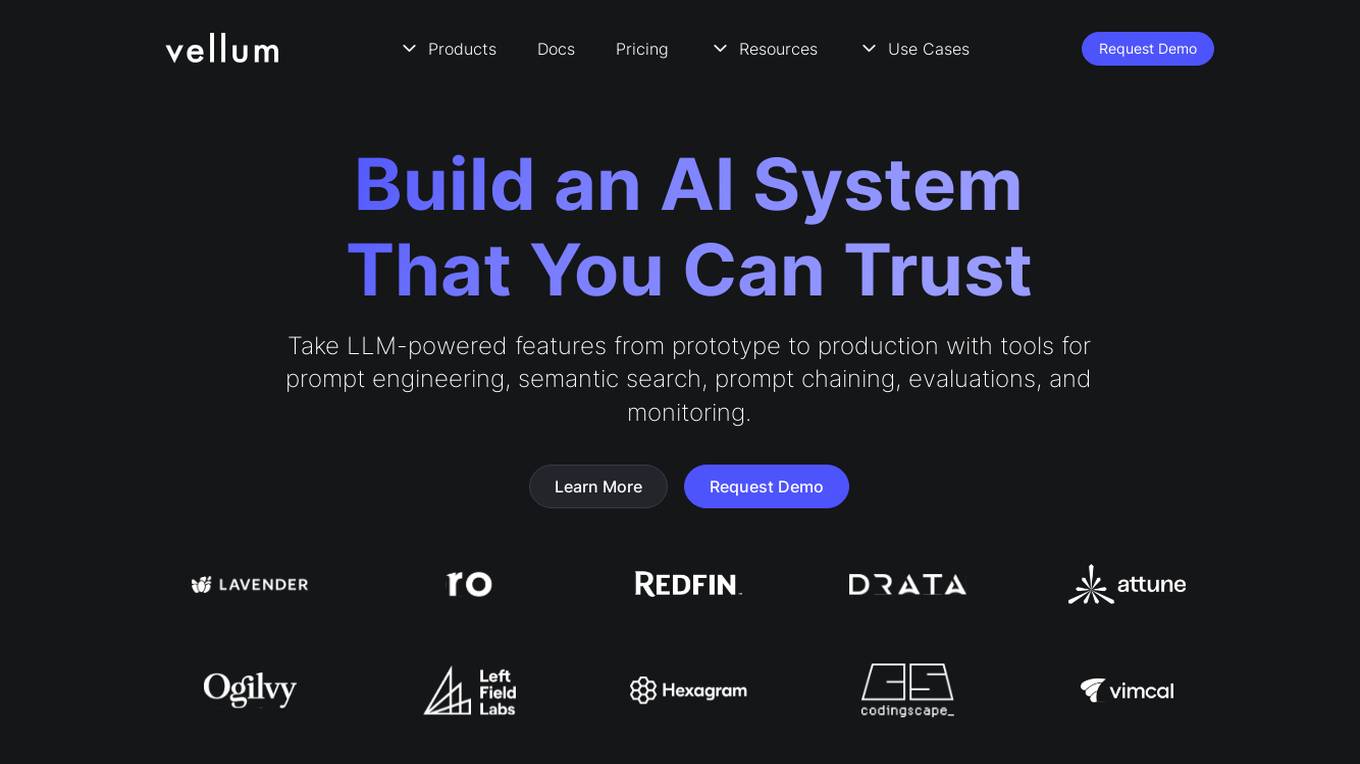
Vellum AI
Vellum AI is an AI platform that supports using Microsoft Azure hosted OpenAI models. It offers tools for prompt engineering, semantic search, prompt chaining, evaluations, and monitoring. Vellum enables users to build AI systems with features like workflow automation, document analysis, fine-tuning, Q&A over documents, intent classification, summarization, vector search, chatbots, blog generation, sentiment analysis, and more. The platform is backed by top VCs and founders of well-known companies, providing a complete solution for building LLM-powered applications.
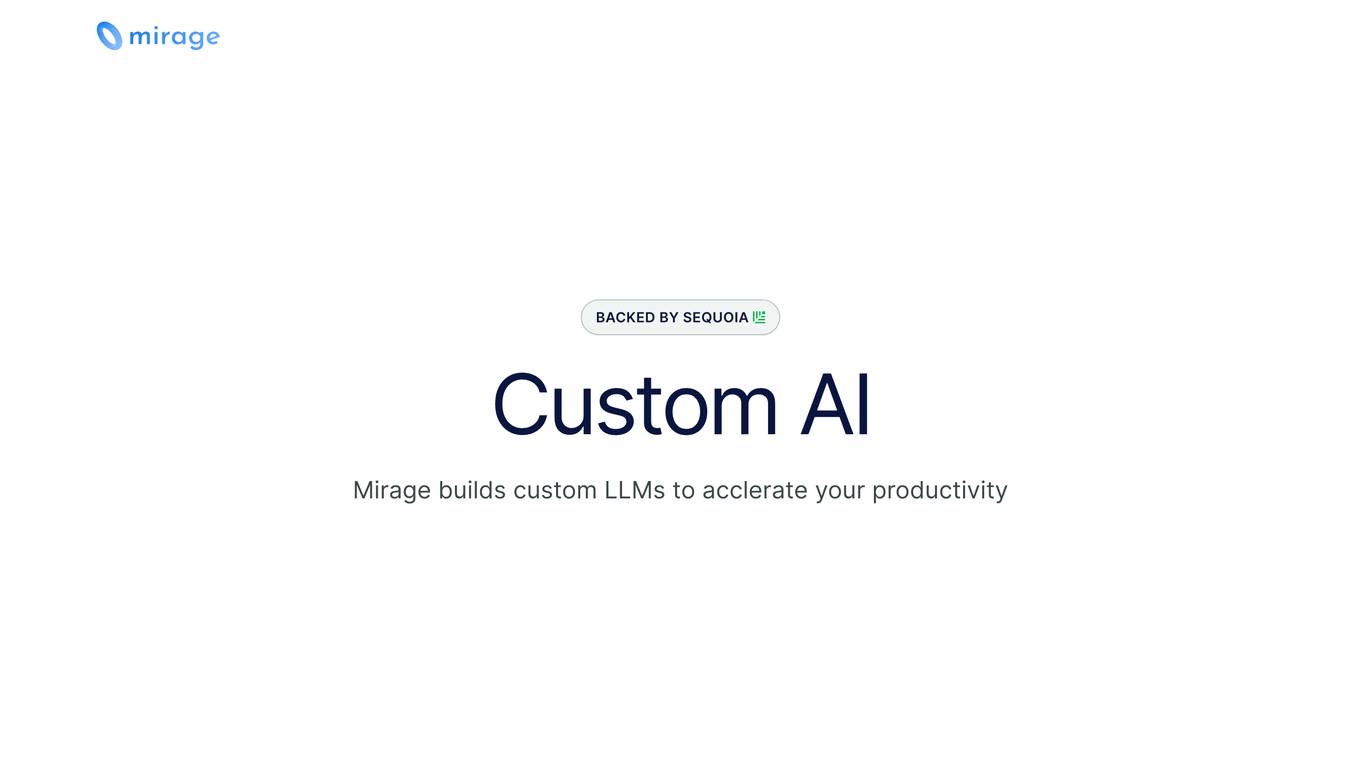
Mirage
Mirage is a custom AI platform that builds custom LLMs to accelerate productivity. It is backed by Sequoia and offers a variety of features, including the ability to create custom AI models, train models on your own data, and deploy models to the cloud or on-premises.
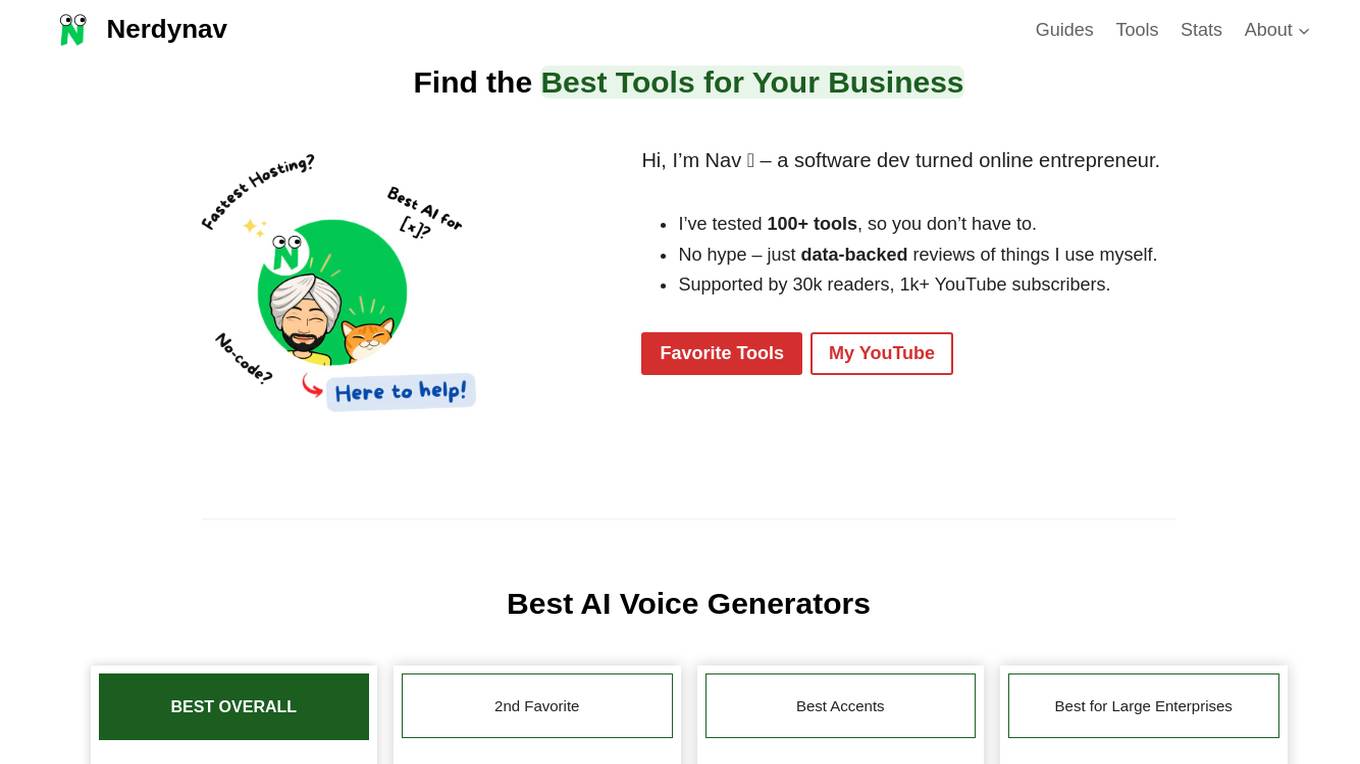
Nerdynav
Nerdynav is a website that provides reviews of AI tools and software for businesses. The website is run by Nav, a software developer and online entrepreneur who has tested over 100 tools to help businesses find the best solutions for their needs. Nerdynav's reviews are data-backed and provide insights into the features, advantages, and disadvantages of each tool. The website also includes articles on how to use AI to improve business processes and increase productivity.
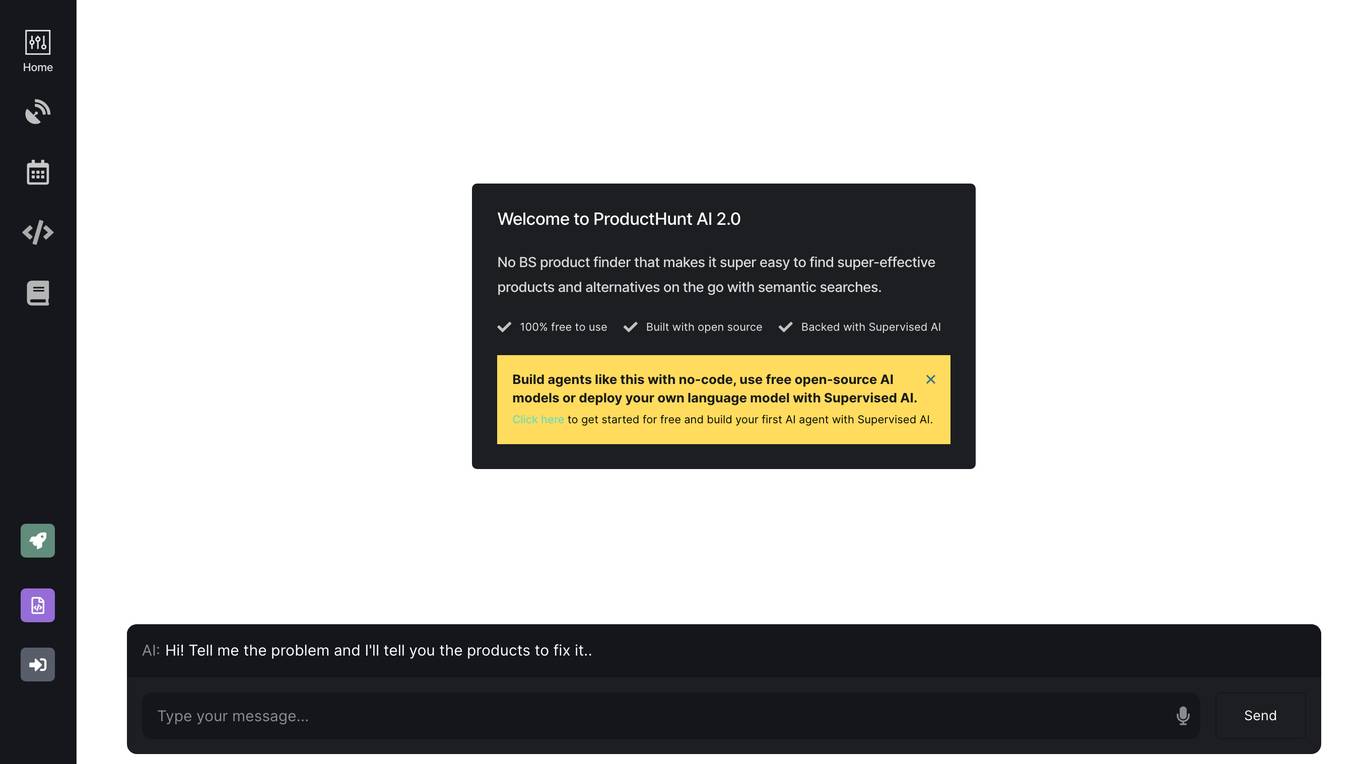
ProductHunt AI 2.0
ProductHunt AI 2.0 is a no-BS product finder that makes it super easy to find super-effective products and alternatives on the go with semantic searches. It is 100% free to use and backed by Supervised AI. With ProductHunt AI 2.0, you can build agents like this with no-code, use free open-source AI models, or deploy your own language model.
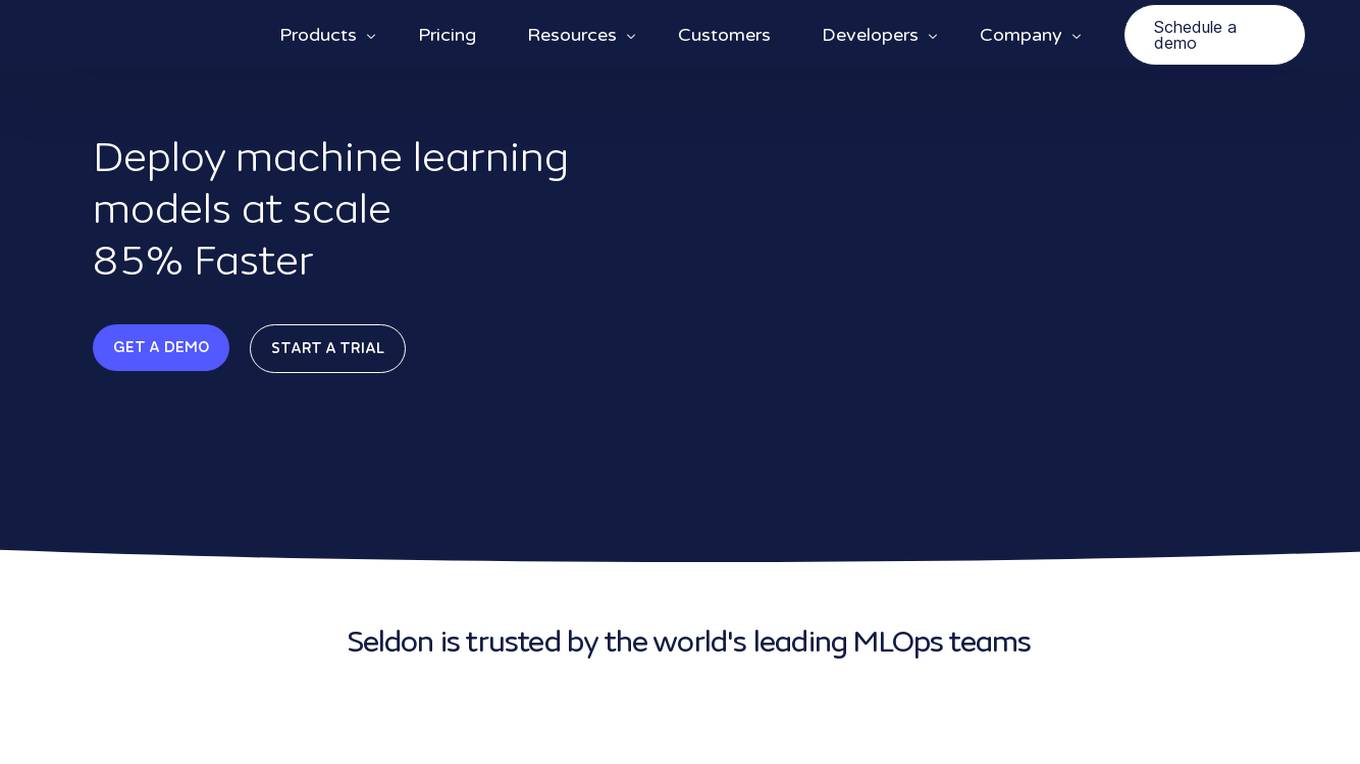
Seldon
Seldon is an MLOps platform that helps enterprises deploy, monitor, and manage machine learning models at scale. It provides a range of features to help organizations accelerate model deployment, optimize infrastructure resource allocation, and manage models and risk. Seldon is trusted by the world's leading MLOps teams and has been used to install and manage over 10 million ML models. With Seldon, organizations can reduce deployment time from months to minutes, increase efficiency, and reduce infrastructure and cloud costs.

Mystic.ai
Mystic.ai is an AI tool designed to deploy and scale Machine Learning models with ease. It offers a fully managed Kubernetes platform that runs in your own cloud, allowing users to deploy ML models in their own Azure/AWS/GCP account or in a shared GPU cluster. Mystic.ai provides cost optimizations, fast inference, simpler developer experience, and performance optimizations to ensure high-performance AI model serving. With features like pay-as-you-go API, cloud integration with AWS/Azure/GCP, and a beautiful dashboard, Mystic.ai simplifies the deployment and management of ML models for data scientists and AI engineers.
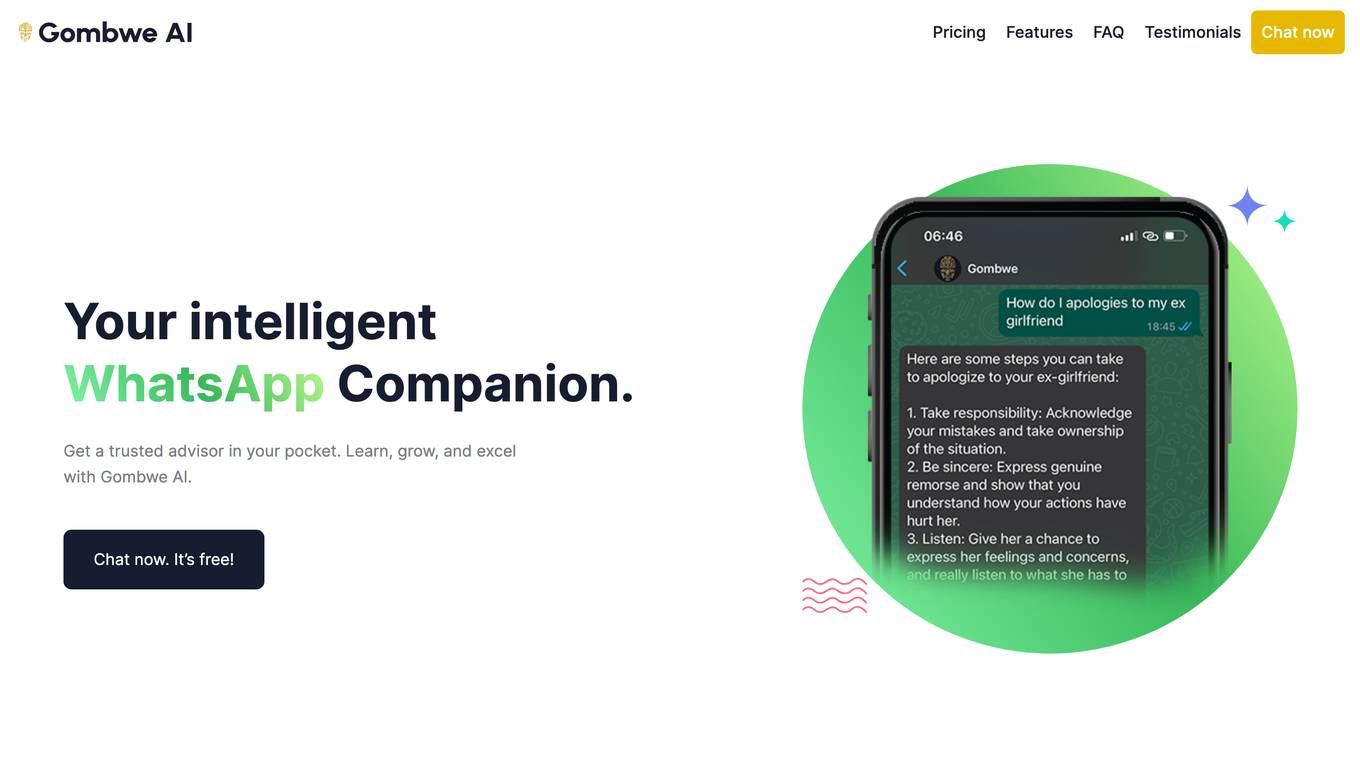
Azure Static Web Apps
Azure Static Web Apps is a platform provided by Microsoft Azure for building and deploying modern web applications. It allows developers to easily host static web content and serverless APIs with seamless integration to popular frameworks like React, Angular, and Vue. With Azure Static Web Apps, developers can quickly set up continuous integration and deployment workflows, enabling them to focus on building great user experiences without worrying about infrastructure management.
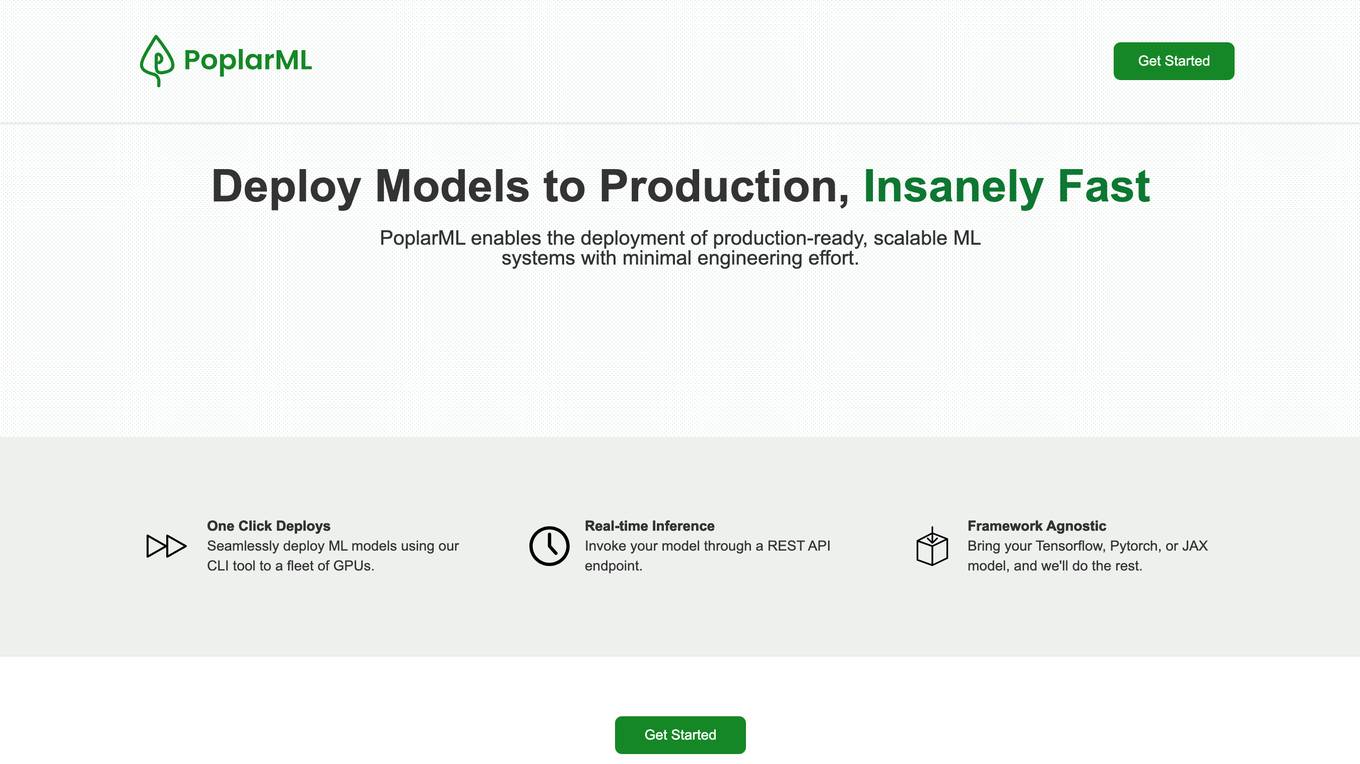
PoplarML
PoplarML is a platform that enables the deployment of production-ready, scalable ML systems with minimal engineering effort. It offers one-click deploys, real-time inference, and framework agnostic support. With PoplarML, users can seamlessly deploy ML models using a CLI tool to a fleet of GPUs and invoke their models through a REST API endpoint. The platform supports Tensorflow, Pytorch, and JAX models.
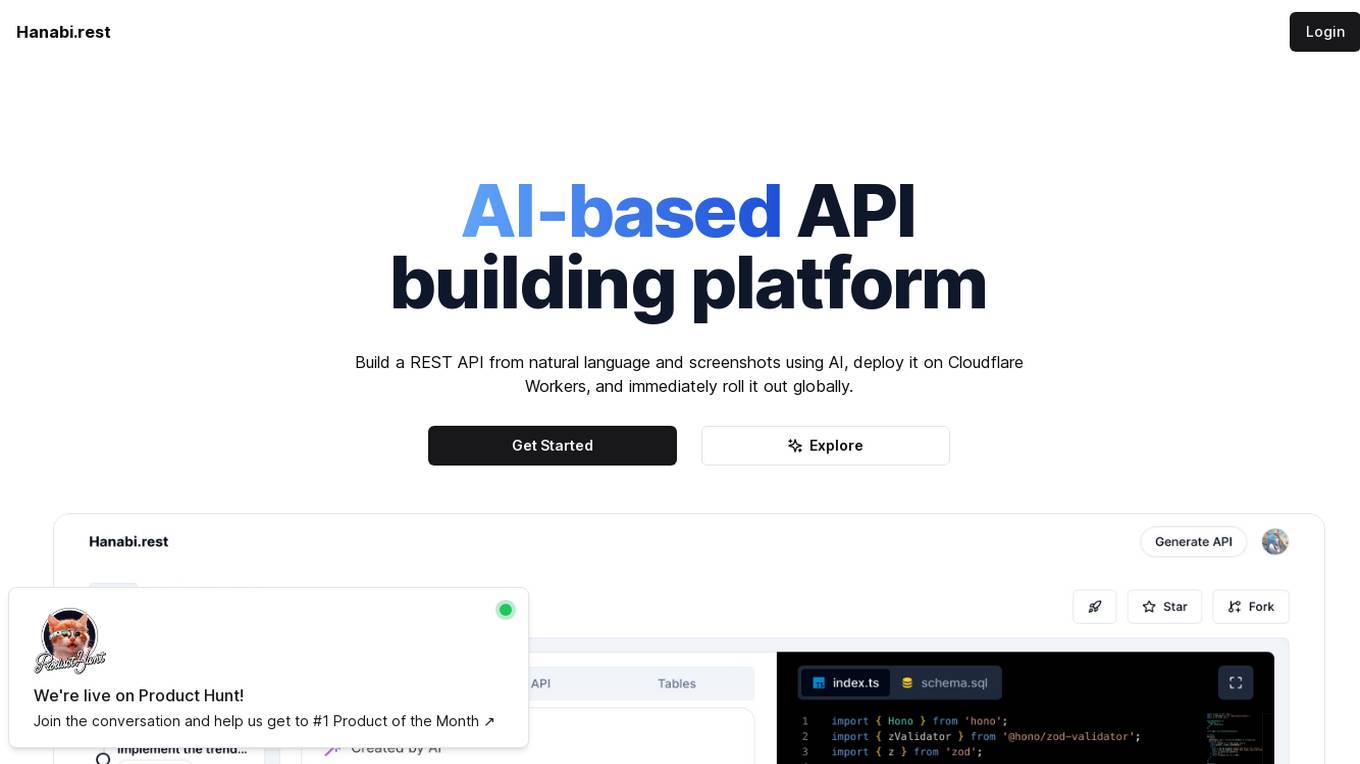
Hanabi.rest
Hanabi.rest is an AI-based API building platform that allows users to create REST APIs from natural language and screenshots using AI technology. Users can deploy the APIs on Cloudflare Workers and roll them out globally. The platform offers a live editor for testing database access and API endpoints, generates code compatible with various runtimes, and provides features like sharing APIs via URL, npm package integration, and CLI dump functionality. Hanabi.rest simplifies API design and deployment by leveraging natural language processing, image recognition, and v0.dev components.

Superflows
Superflows is a tool that allows you to add an AI Copilot to your SaaS product. This AI Copilot can answer questions and perform tasks for users via chat. It is designed to be easy to set up and configure, and it can be integrated into your codebase with just a few lines of code. Superflows is a great way to improve the user experience of your SaaS product and help users get the most out of your software.
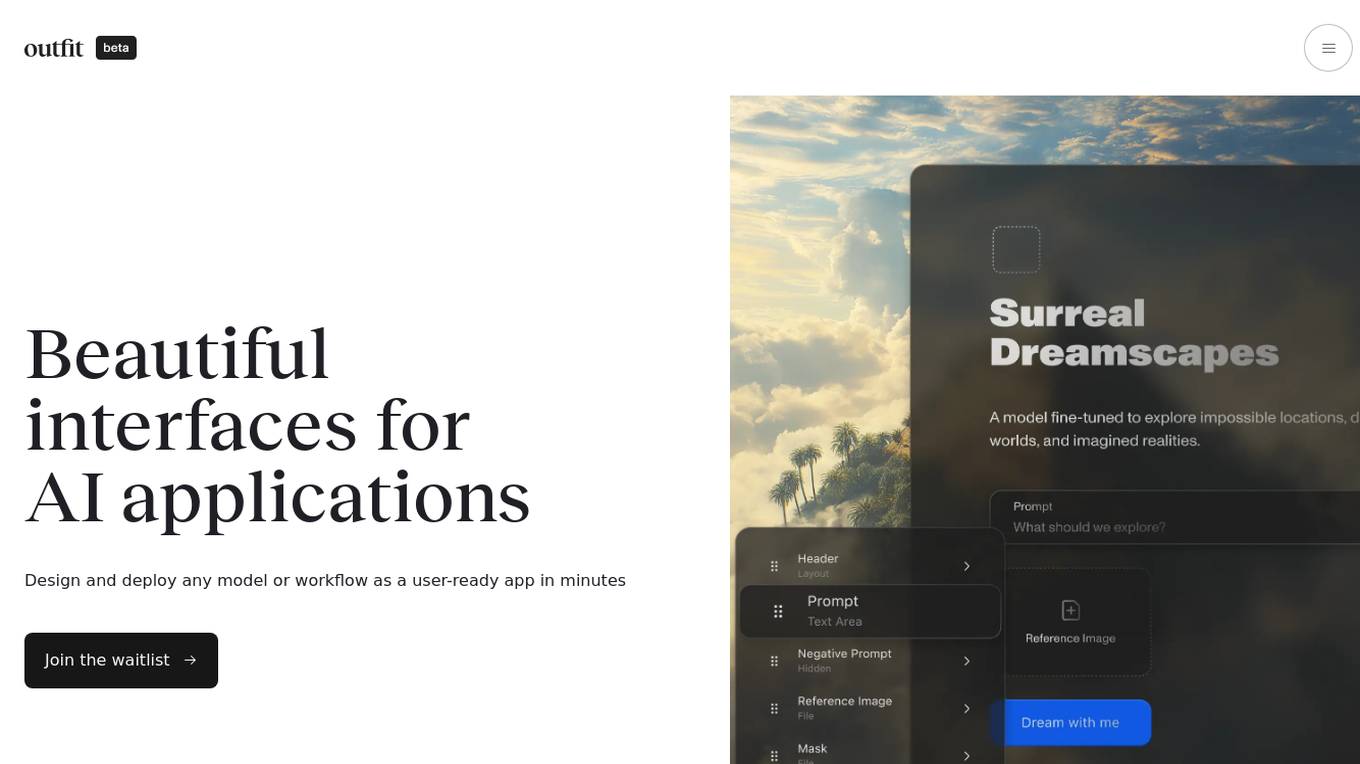
Outfit AI
Outfit AI is an AI tool that enables users to design and deploy AI models or workflows as user-ready applications in minutes. It allows users to create custom user interfaces for their AI-powered apps by dropping in an API key from Replicate or Hugging Face. With Outfit AI, users can have creative control over the design of their apps, build complex workflows without any code, and optimize prompts for better performance. The tool aims to help users launch their models faster, save time, and enhance their AI applications with a built-in product copilot.
20 - Open Source AI Tools
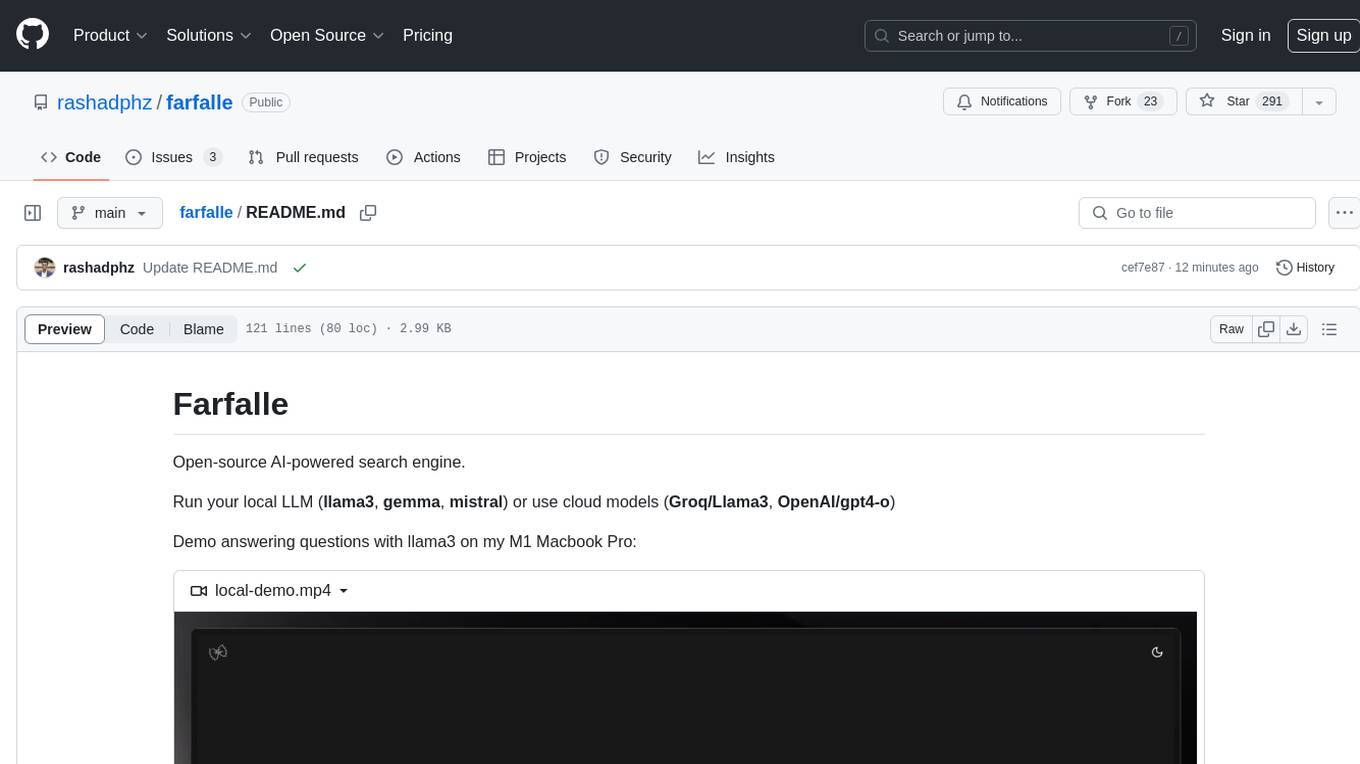
farfalle
Farfalle is an open-source AI-powered search engine that allows users to run their own local LLM or utilize the cloud. It provides a tech stack including Next.js for frontend, FastAPI for backend, Tavily for search API, Logfire for logging, and Redis for rate limiting. Users can get started by setting up prerequisites like Docker and Ollama, and obtaining API keys for Tavily, OpenAI, and Groq. The tool supports models like llama3, mistral, and gemma. Users can clone the repository, set environment variables, run containers using Docker Compose, and deploy the backend and frontend using services like Render and Vercel.
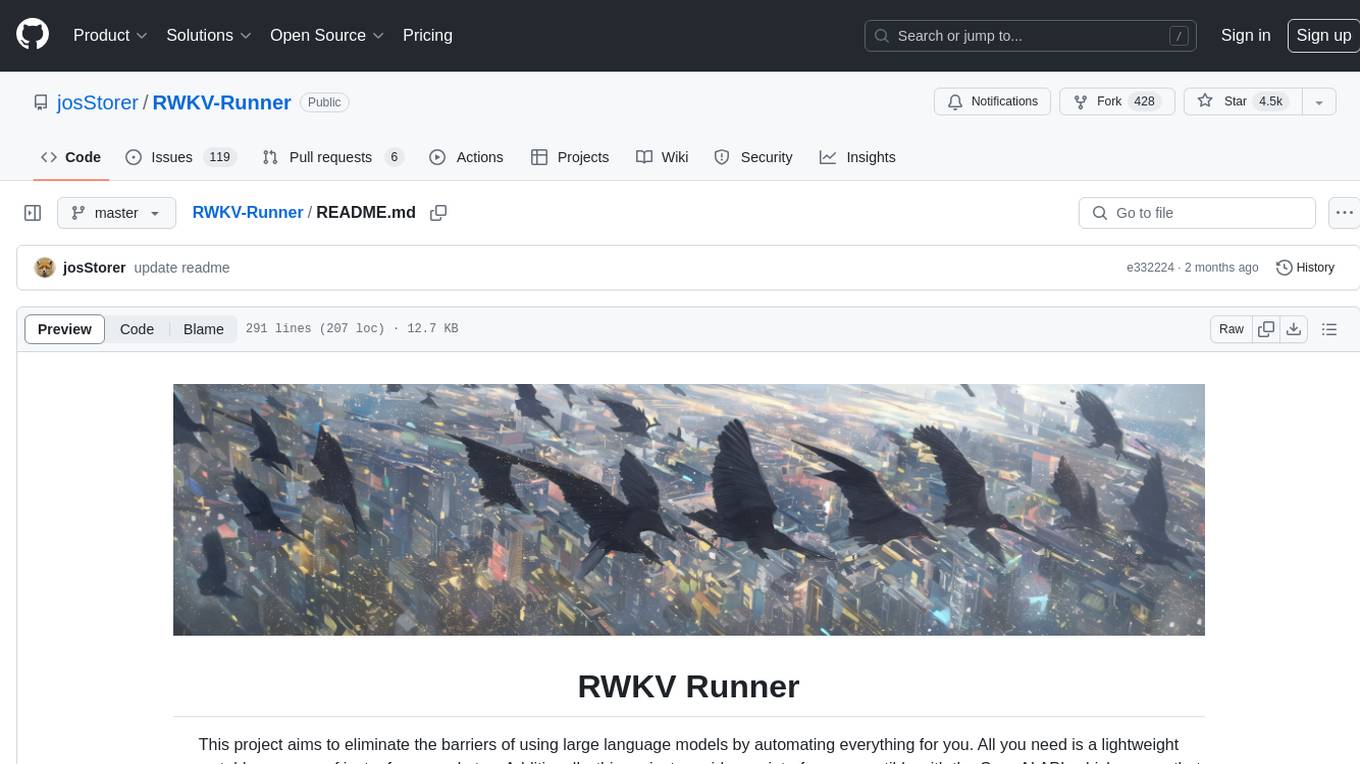
RWKV-Runner
RWKV Runner is a project designed to simplify the usage of large language models by automating various processes. It provides a lightweight executable program and is compatible with the OpenAI API. Users can deploy the backend on a server and use the program as a client. The project offers features like model management, VRAM configurations, user-friendly chat interface, WebUI option, parameter configuration, model conversion tool, download management, LoRA Finetune, and multilingual localization. It can be used for various tasks such as chat, completion, composition, and model inspection.
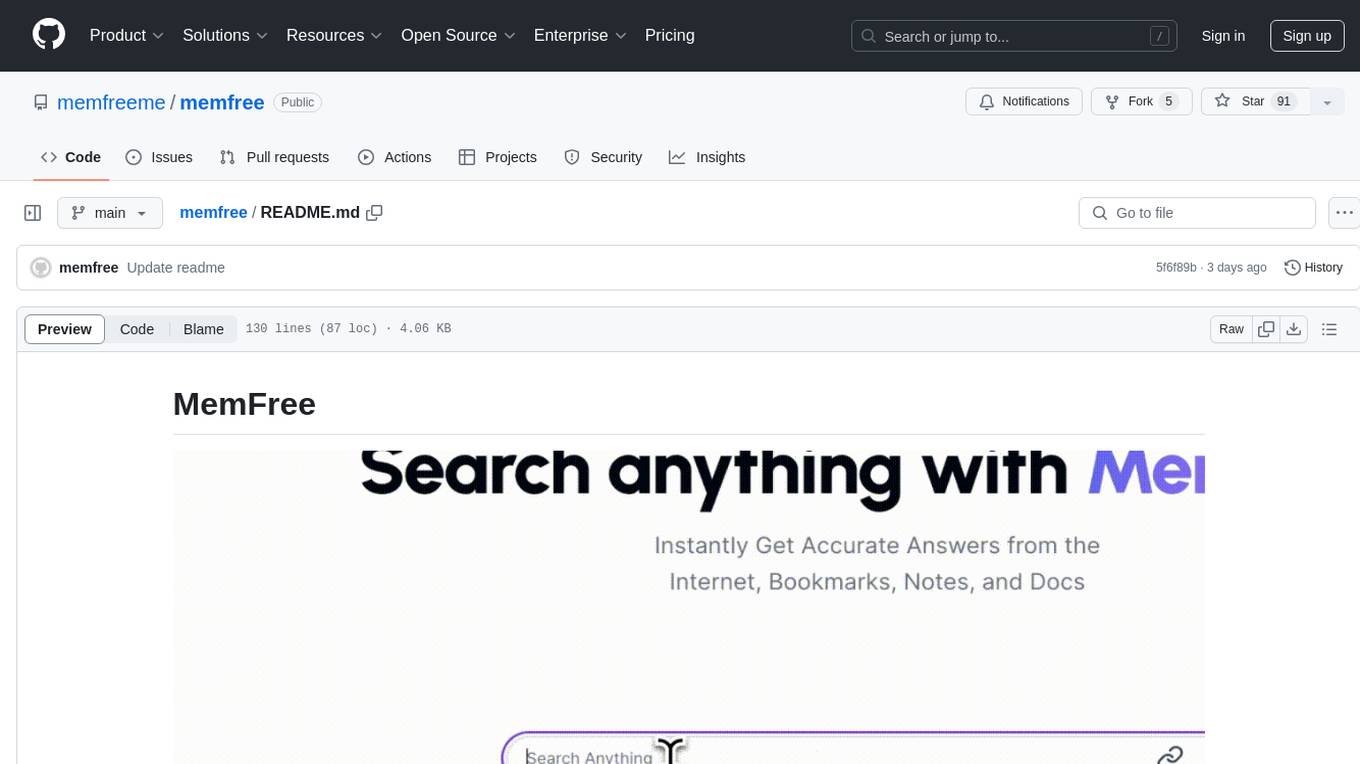
memfree
MemFree is an open-source hybrid AI search engine that allows users to simultaneously search their personal knowledge base (bookmarks, notes, documents, etc.) and the Internet. It features a self-hosted super fast serverless vector database, local embedding and rerank service, one-click Chrome bookmarks index, and full code open source. Users can contribute by opening issues for bugs or making pull requests for new features or improvements.
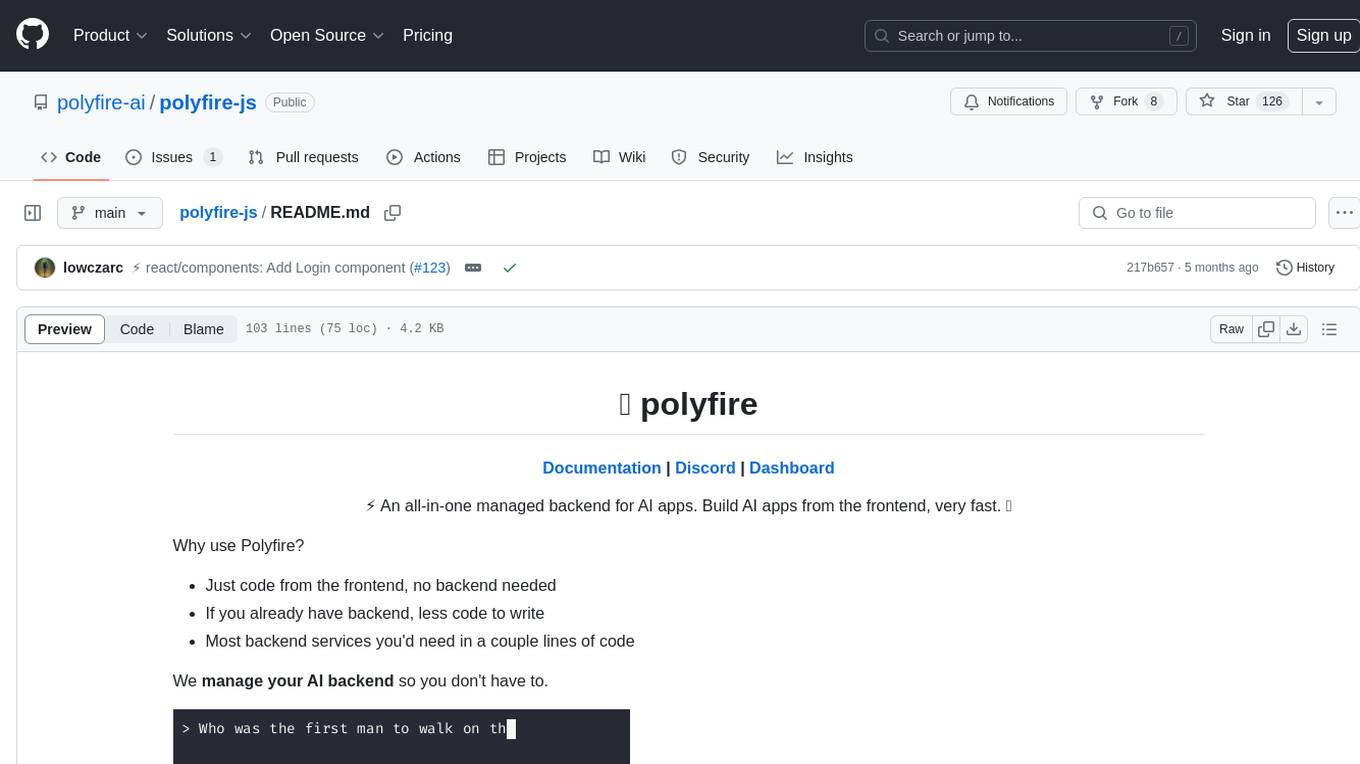
polyfire-js
Polyfire is an all-in-one managed backend for AI apps that allows users to build AI applications directly from the frontend, eliminating the need for a separate backend. It simplifies the process by providing most backend services in just a few lines of code. With Polyfire, users can easily create chatbots, transcribe audio files, generate simple text, manage long-term memory, and generate images. The tool also offers starter guides and tutorials to help users get started quickly and efficiently.
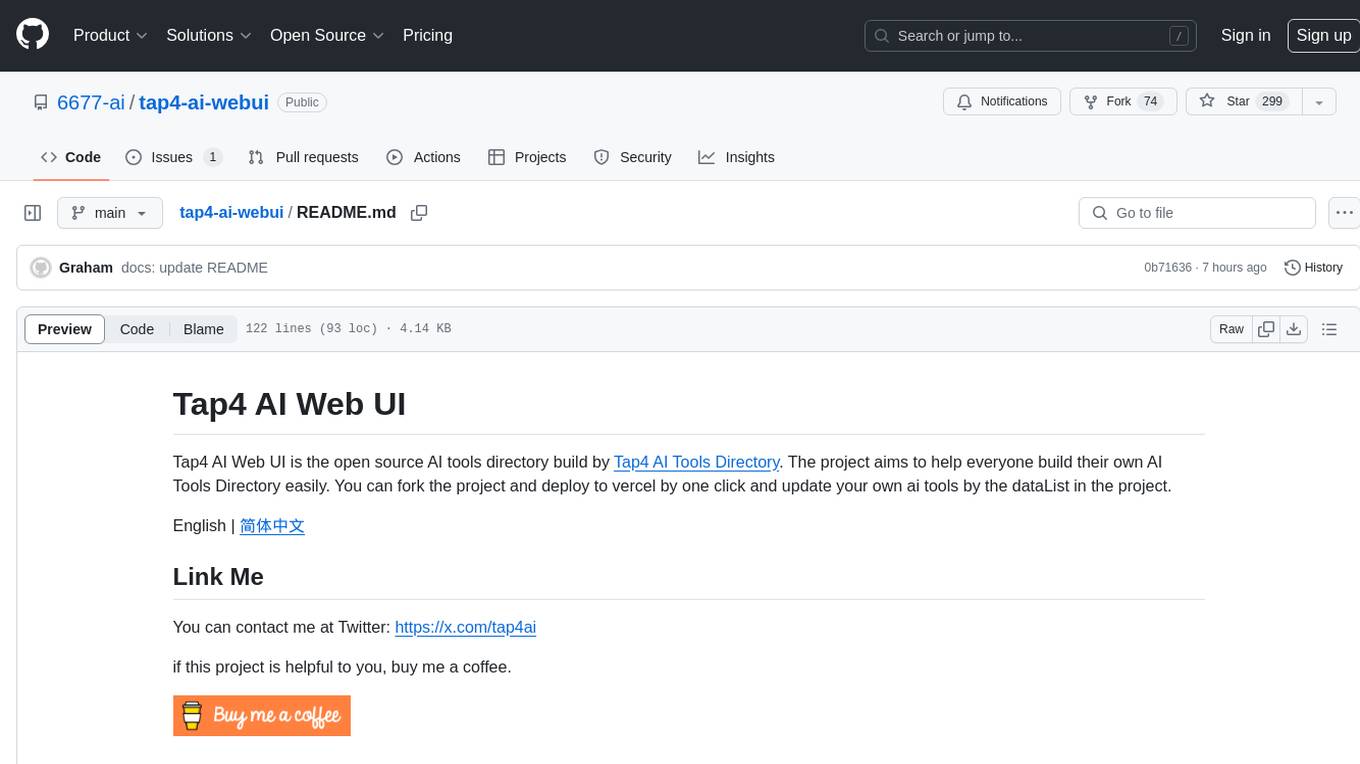
tap4-ai-webui
Tap4 AI Web UI is an open source AI tools directory built by Tap4 AI Tools Directory. The project aims to help everyone build their own AI Tools Directory easily. Users can fork the project, deploy it to Vercel with one click, and update their own AI tools using the data list in the project. The web UI features internationalization, SEO friendliness, dynamic sitemap generation, fast shipping, NEXT 14 with app route, and integration with Supabase serverless database.
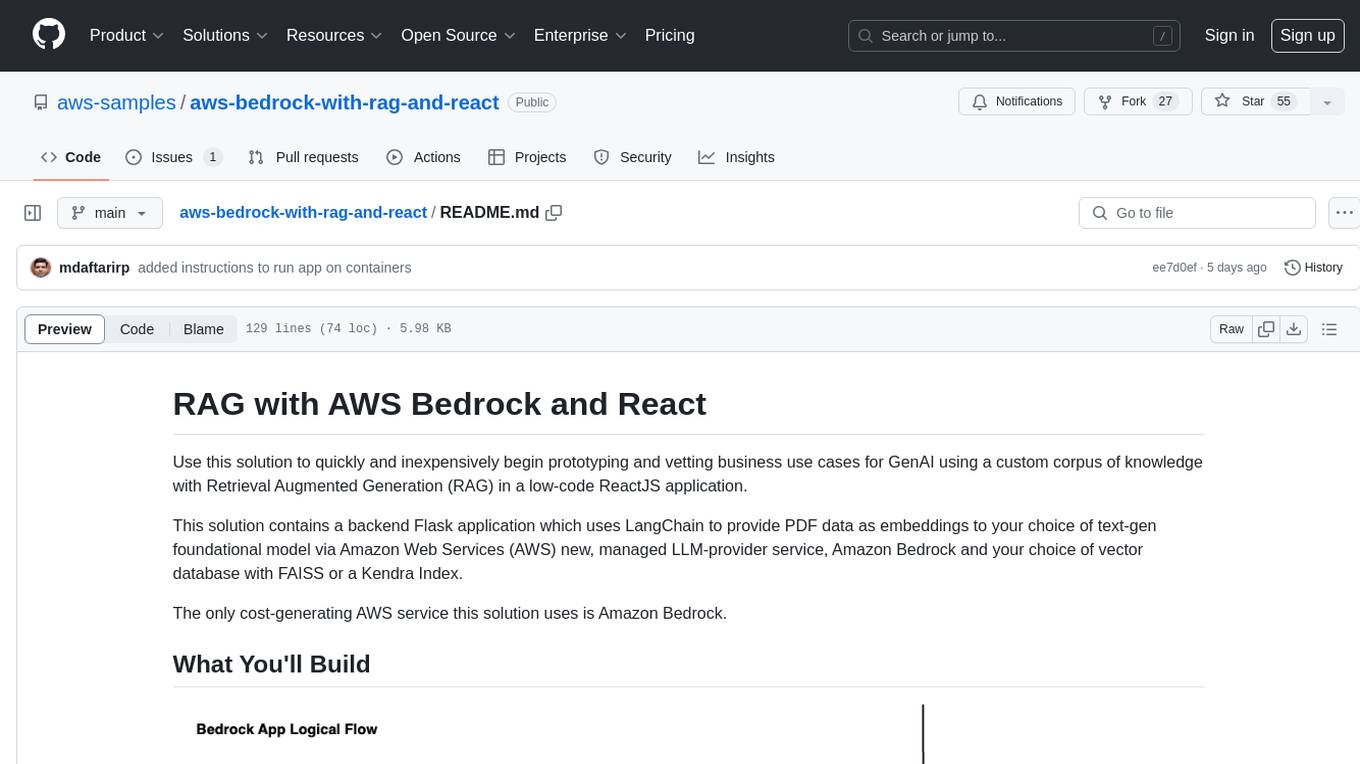
aws-bedrock-with-rag-and-react
This solution provides a low-code ReactJS application to prototype and vet business use cases for GenAI using Retrieval Augmented Generation (RAG). It includes a backend Flask application that uses LangChain to provide PDF data as embeddings to a text-gen model via Amazon Bedrock and a vector database with FAISS or Kendra Index. The solution utilizes Amazon Bedrock as the only cost-generating AWS service.
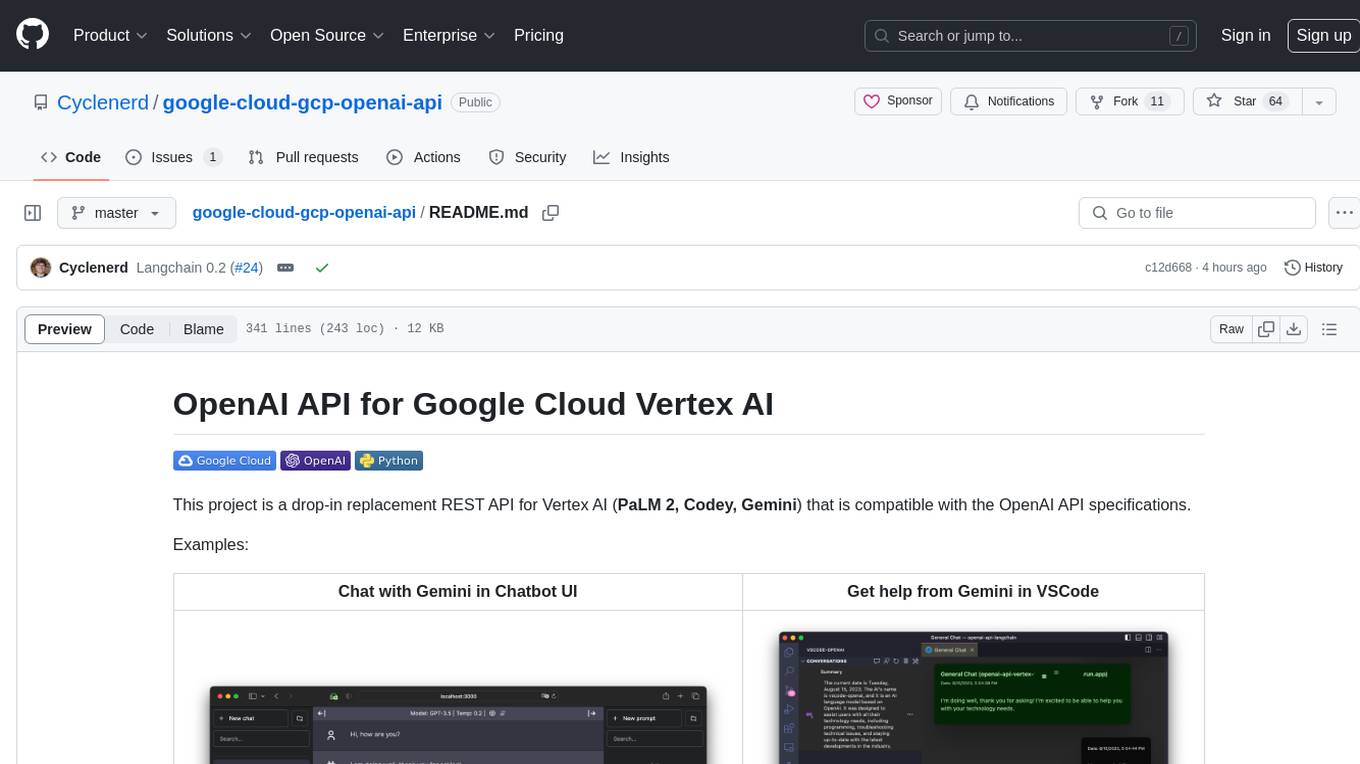
google-cloud-gcp-openai-api
This project provides a drop-in replacement REST API for Google Cloud Vertex AI (PaLM 2, Codey, Gemini) that is compatible with the OpenAI API specifications. It aims to make Google Cloud Platform Vertex AI more accessible by translating OpenAI API calls to Vertex AI. The software is developed in Python and based on FastAPI and LangChain, designed to be simple and customizable for individual needs. It includes step-by-step guides for deployment, supports various OpenAI API services, and offers configuration through environment variables. Additionally, it provides examples for running locally and usage instructions consistent with the OpenAI API format.
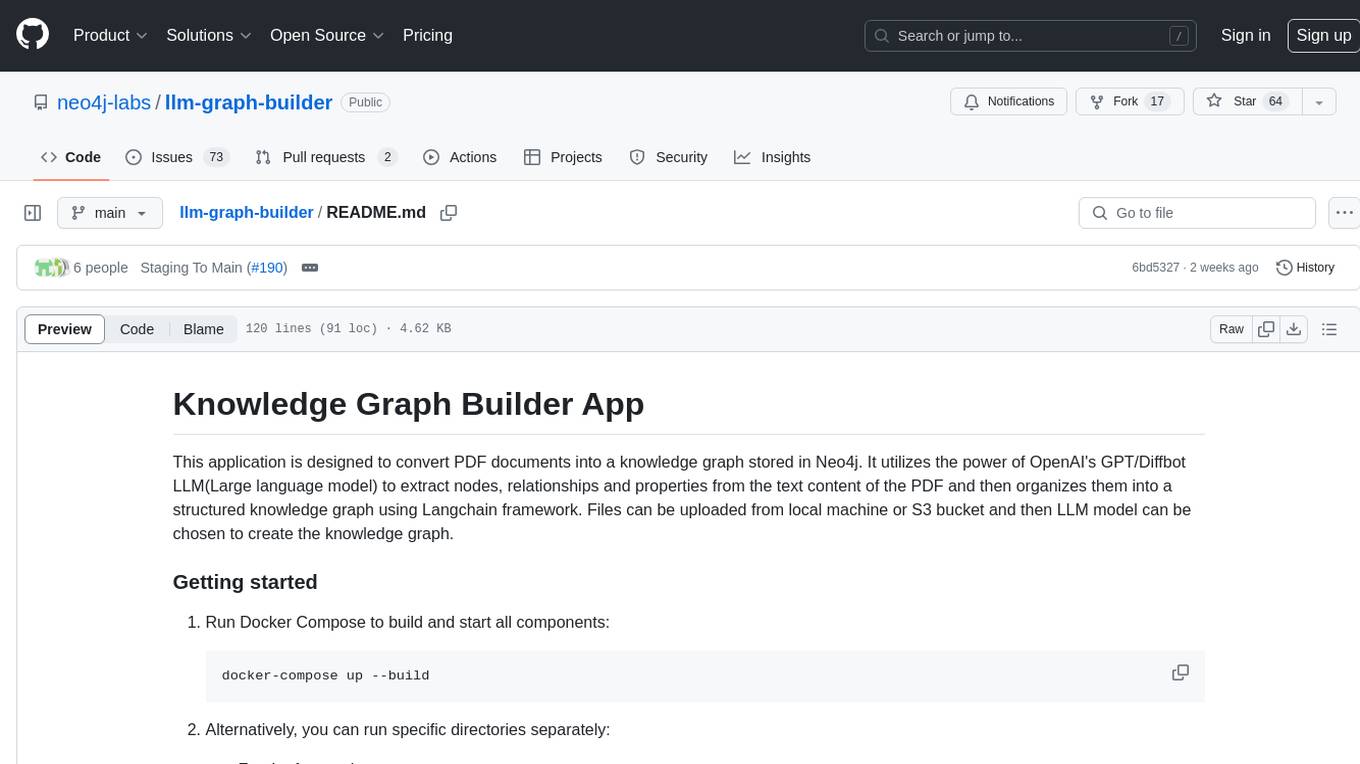
llm-graph-builder
Knowledge Graph Builder App is a tool designed to convert PDF documents into a structured knowledge graph stored in Neo4j. It utilizes OpenAI's GPT/Diffbot LLM to extract nodes, relationships, and properties from PDF text content. Users can upload files from local machine or S3 bucket, choose LLM model, and create a knowledge graph. The app integrates with Neo4j for easy visualization and querying of extracted information.
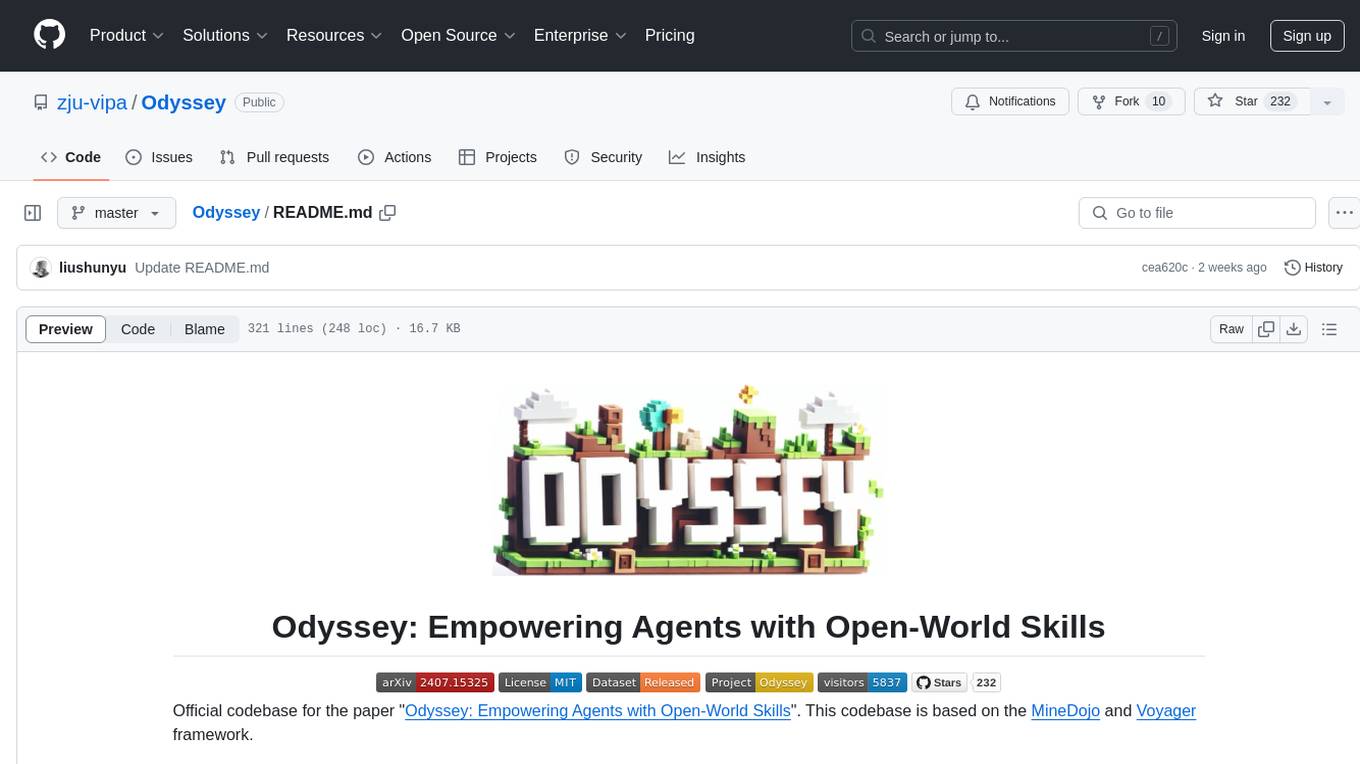
Odyssey
Odyssey is a framework designed to empower agents with open-world skills in Minecraft. It provides an interactive agent with a skill library, a fine-tuned LLaMA-3 model, and an open-world benchmark for evaluating agent capabilities. The framework enables agents to explore diverse gameplay opportunities in the vast Minecraft world by offering primitive and compositional skills, extensive training data, and various long-term planning tasks. Odyssey aims to advance research on autonomous agent solutions by providing datasets, model weights, and code for public use.
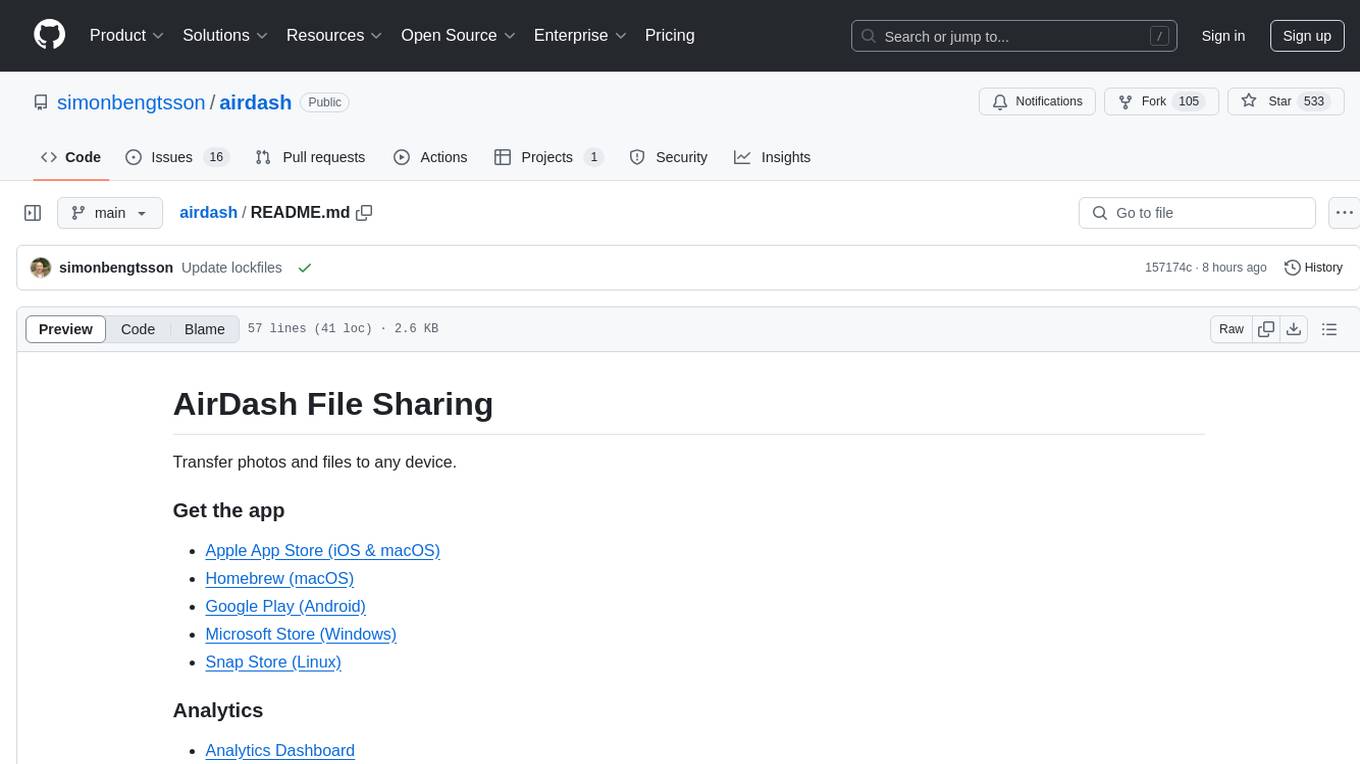
airdash
AirDash is a file sharing tool that allows users to transfer photos and files securely between devices on different platforms. It offers maximum privacy and security by encrypting files and transferring them directly. Users can quickly start transfers using native mobile share sheet and drag and drop on desktop. The tool supports all major platforms and app stores, and automatically selects the best and fastest connection available. Key technologies include Flutter 3 for app development, WebRTC for file transfers, and Firebase services for signaling, config storage, and release automation. AirDash is free to use and suitable for sharing any number of files of any size.
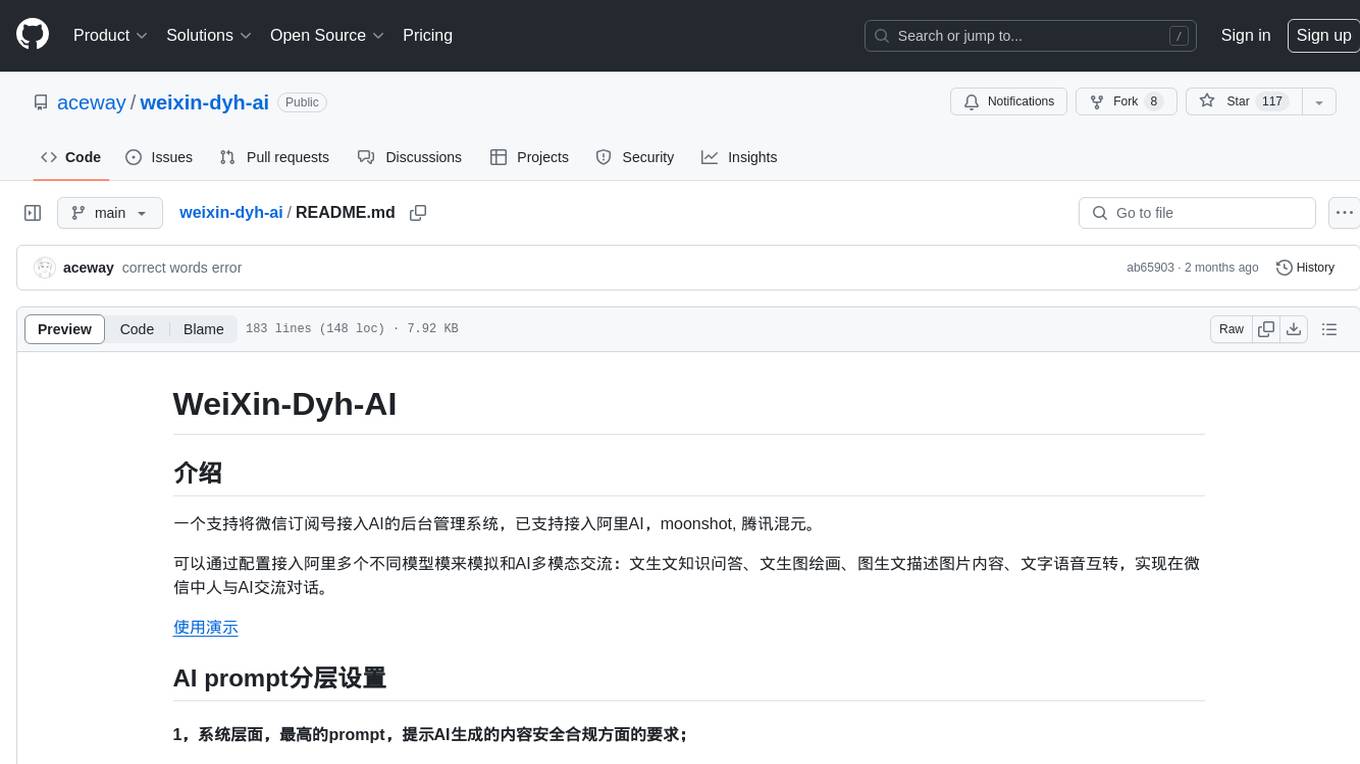
weixin-dyh-ai
WeiXin-Dyh-AI is a backend management system that supports integrating WeChat subscription accounts with AI services. It currently supports integration with Ali AI, Moonshot, and Tencent Hyunyuan. Users can configure different AI models to simulate and interact with AI in multiple modes: text-based knowledge Q&A, text-to-image drawing, image description, text-to-voice conversion, enabling human-AI conversations on WeChat. The system allows hierarchical AI prompt settings at system, subscription account, and WeChat user levels. Users can configure AI model types, providers, and specific instances. The system also supports rules for allocating models and keys at different levels. It addresses limitations of WeChat's messaging system and offers features like text-based commands and voice support for interactions with AI.

azure-search-openai-javascript
This sample demonstrates a few approaches for creating ChatGPT-like experiences over your own data using the Retrieval Augmented Generation pattern. It uses Azure OpenAI Service to access the ChatGPT model (gpt-35-turbo), and Azure AI Search for data indexing and retrieval.
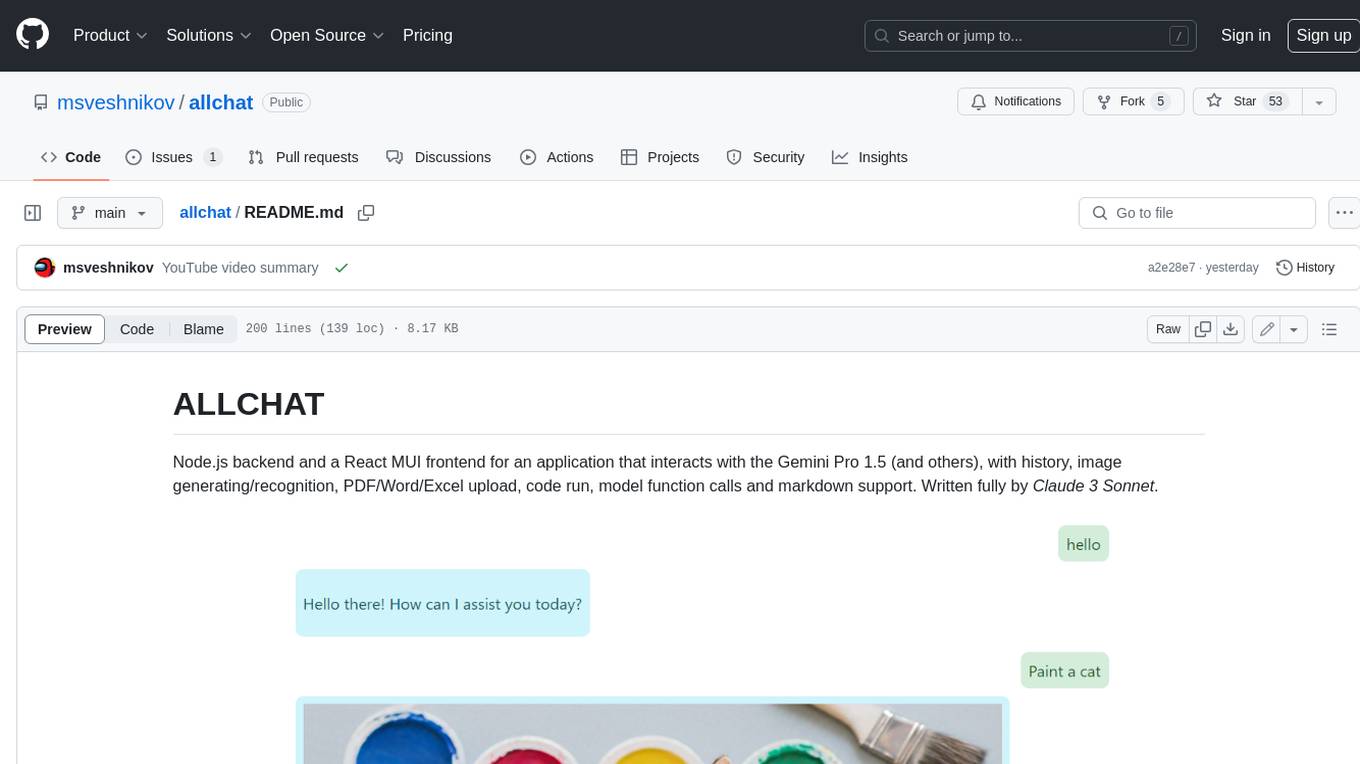
allchat
ALLCHAT is a Node.js backend and React MUI frontend for an application that interacts with the Gemini Pro 1.5 (and others), with history, image generating/recognition, PDF/Word/Excel upload, code run, model function calls and markdown support. It is a comprehensive tool that allows users to connect models to the world with Web Tools, run locally, deploy using Docker, configure Nginx, and monitor the application using a dockerized monitoring solution (Loki+Grafana).
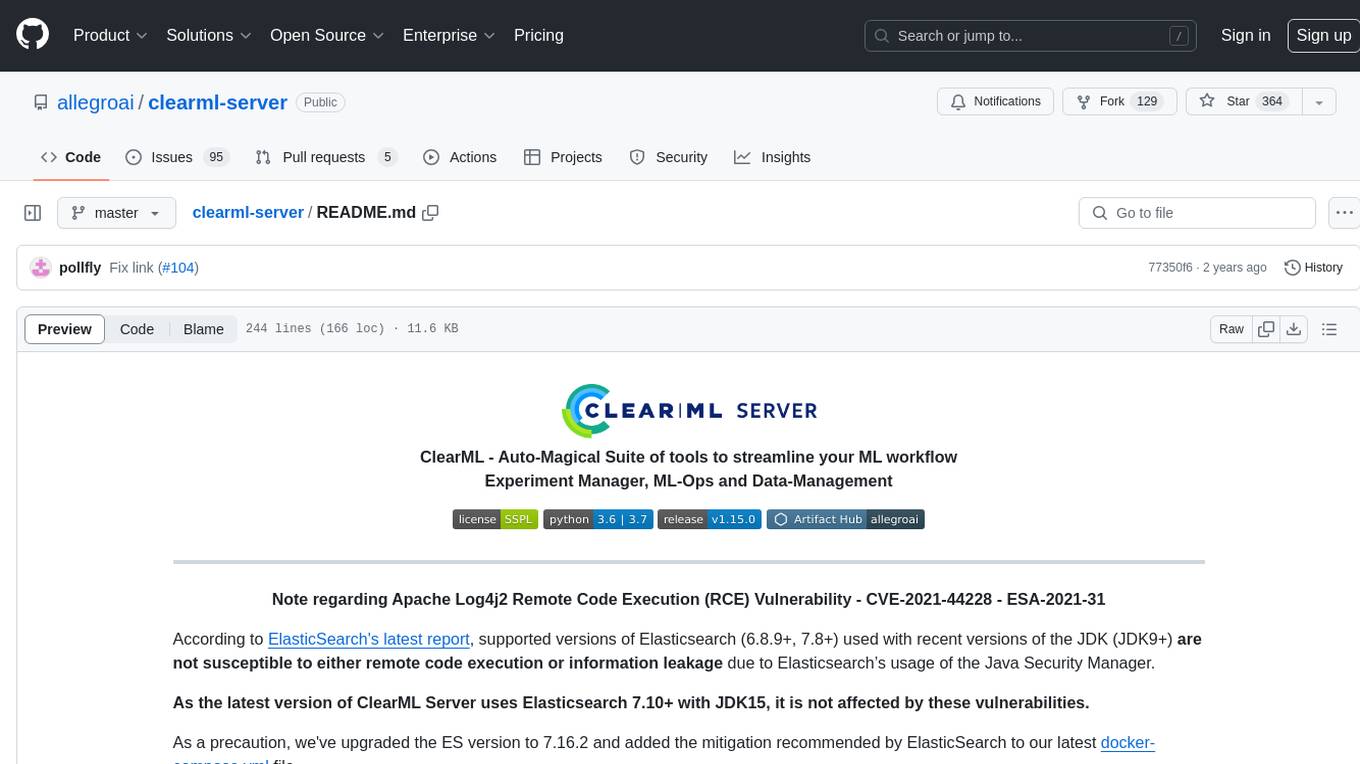
clearml-server
ClearML Server is a backend service infrastructure for ClearML, facilitating collaboration and experiment management. It includes a web app, RESTful API, and file server for storing images and models. Users can deploy ClearML Server using Docker, AWS EC2 AMI, or Kubernetes. The system design supports single IP or sub-domain configurations with specific open ports. ClearML-Agent Services container allows launching long-lasting jobs and various use cases like auto-scaler service, controllers, optimizer, and applications. Advanced functionality includes web login authentication and non-responsive experiments watchdog. Upgrading ClearML Server involves stopping containers, backing up data, downloading the latest docker-compose.yml file, configuring ClearML-Agent Services, and spinning up docker containers. Community support is available through ClearML FAQ, Stack Overflow, GitHub issues, and email contact.
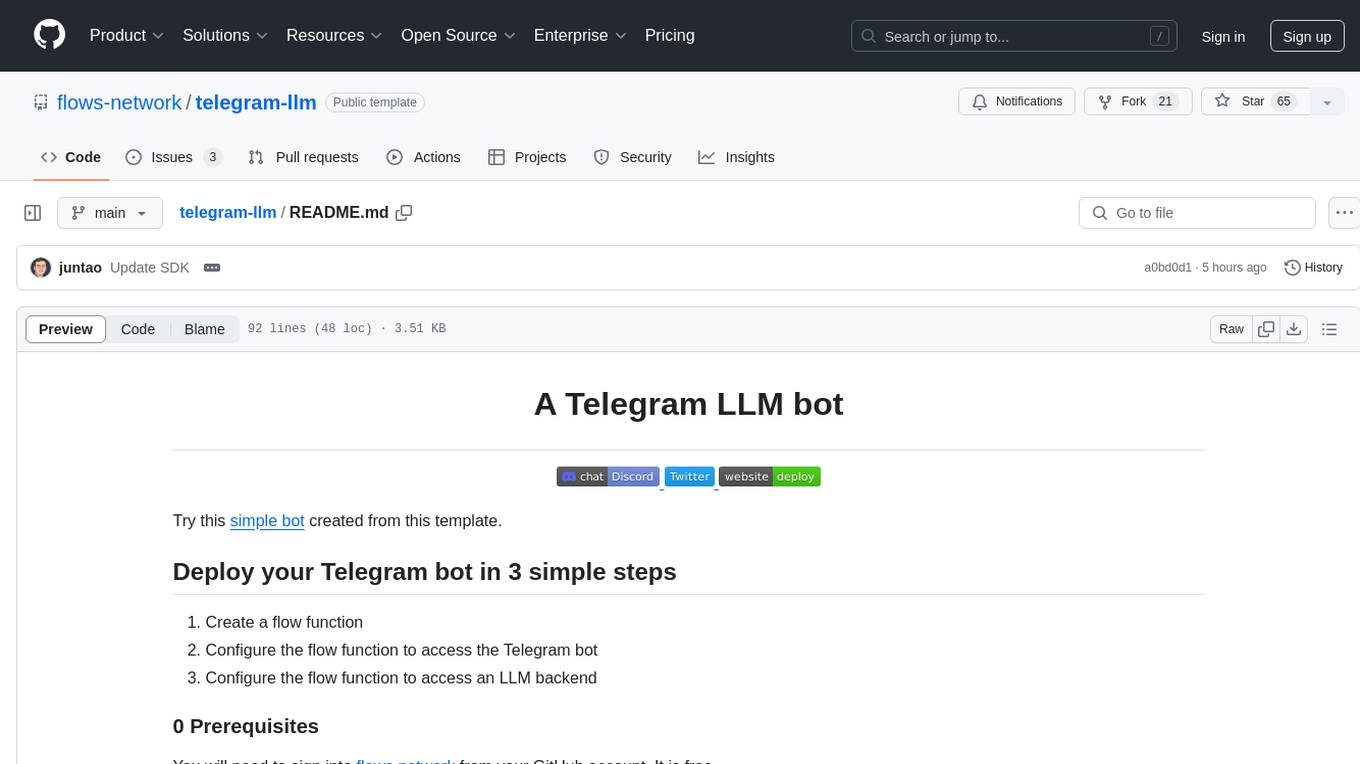
telegram-llm
A Telegram LLM bot that allows users to deploy their own Telegram bot in 3 simple steps by creating a flow function, configuring access to the Telegram bot, and connecting to an LLM backend. Users need to sign into flows.network, have a bot token from Telegram, and an OpenAI API key. The bot can be customized with ChatGPT prompts and integrated with OpenAI and Telegram for various functionalities.

agentcloud
AgentCloud is an open-source platform that enables companies to build and deploy private LLM chat apps, empowering teams to securely interact with their data. It comprises three main components: Agent Backend, Webapp, and Vector Proxy. To run this project locally, clone the repository, install Docker, and start the services. The project is licensed under the GNU Affero General Public License, version 3 only. Contributions and feedback are welcome from the community.
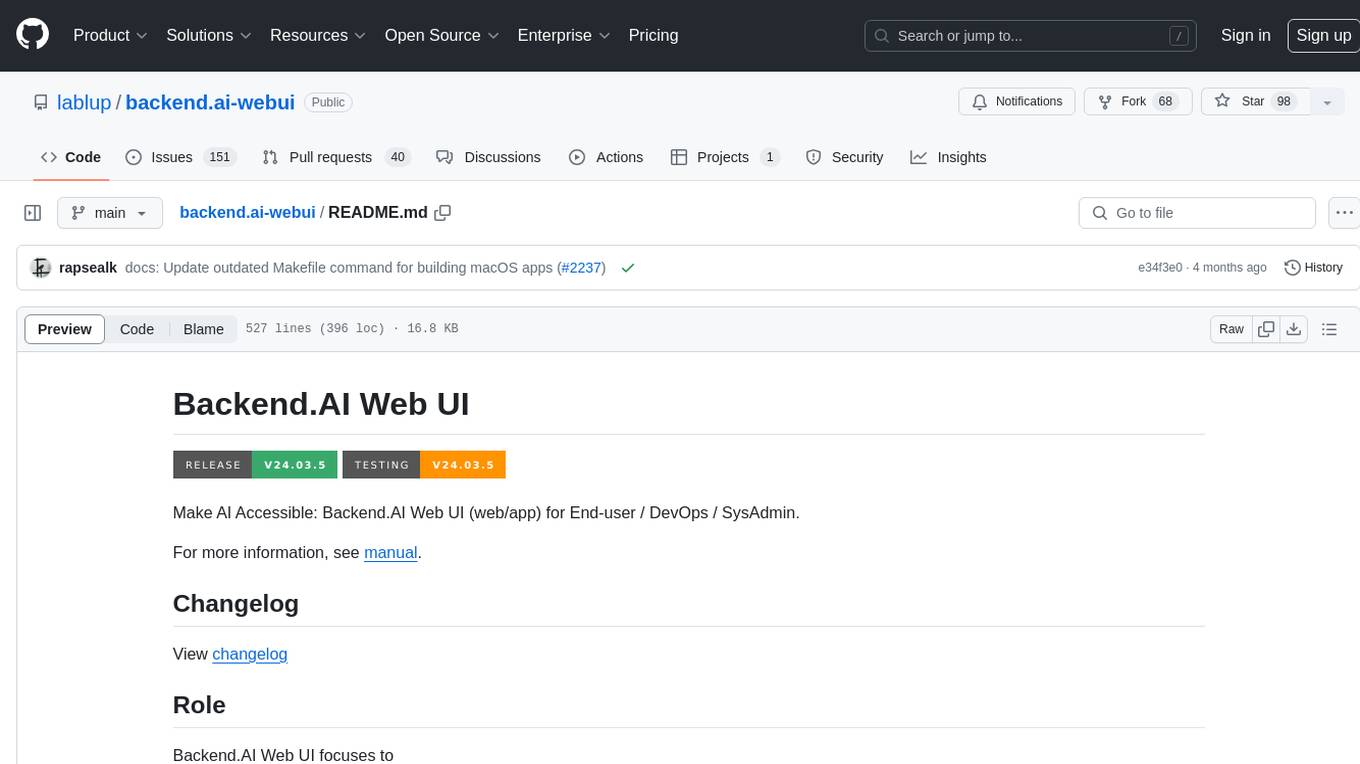
backend.ai-webui
Backend.AI Web UI is a user-friendly web and app interface designed to make AI accessible for end-users, DevOps, and SysAdmins. It provides features for session management, inference service management, pipeline management, storage management, node management, statistics, configurations, license checking, plugins, help & manuals, kernel management, user management, keypair management, manager settings, proxy mode support, service information, and integration with the Backend.AI Web Server. The tool supports various devices, offers a built-in websocket proxy feature, and allows for versatile usage across different platforms. Users can easily manage resources, run environment-supported apps, access a web-based terminal, use Visual Studio Code editor, manage experiments, set up autoscaling, manage pipelines, handle storage, monitor nodes, view statistics, configure settings, and more.
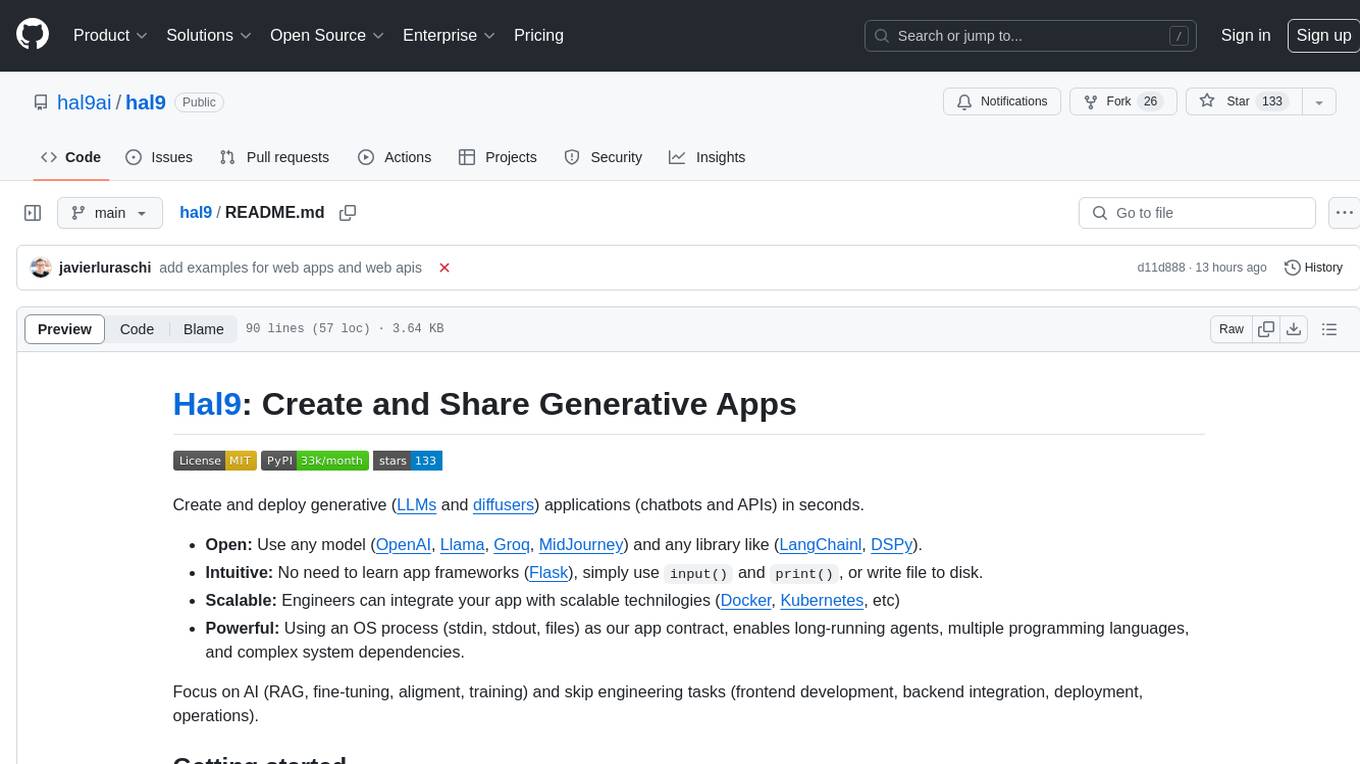
hal9
Hal9 is a tool that allows users to create and deploy generative applications such as chatbots and APIs quickly. It is open, intuitive, scalable, and powerful, enabling users to use various models and libraries without the need to learn complex app frameworks. With a focus on AI tasks like RAG, fine-tuning, alignment, and training, Hal9 simplifies the development process by skipping engineering tasks like frontend development, backend integration, deployment, and operations.
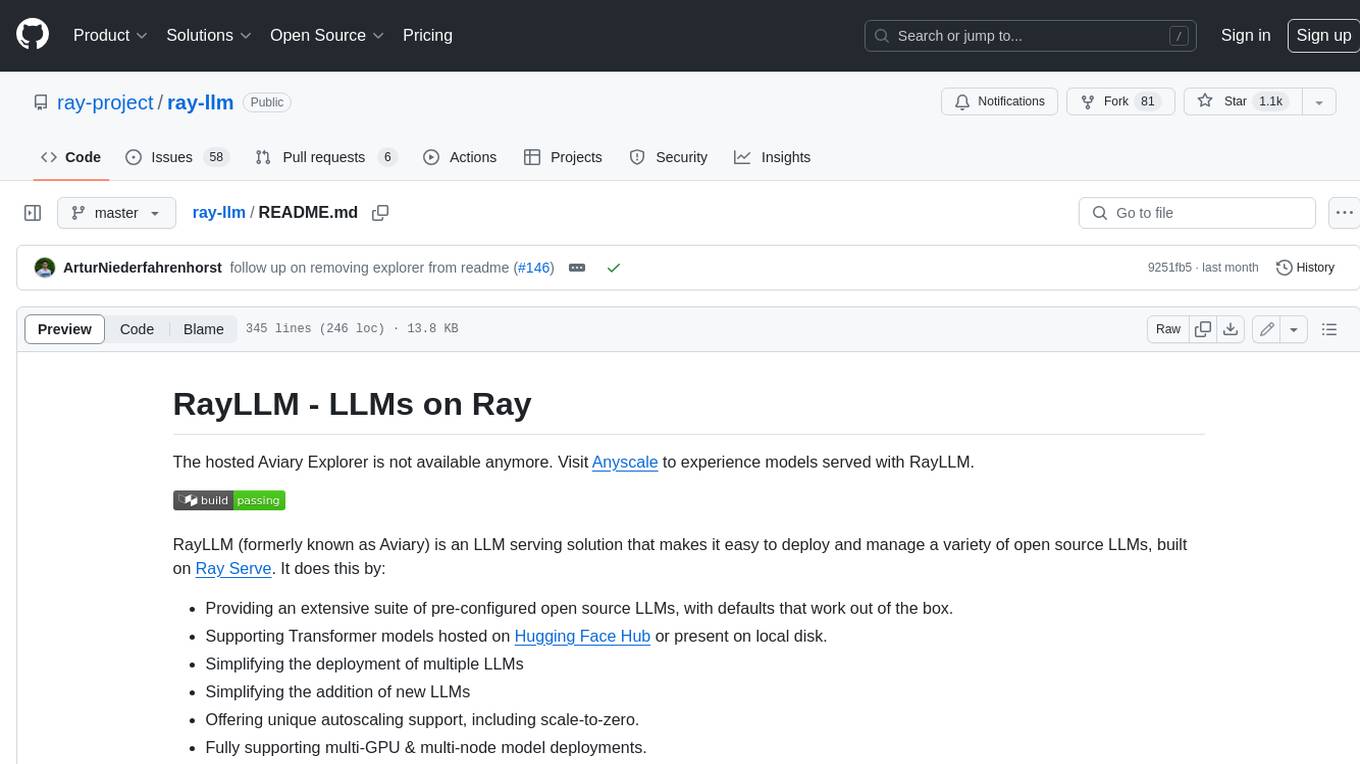
ray-llm
RayLLM (formerly known as Aviary) is an LLM serving solution that makes it easy to deploy and manage a variety of open source LLMs, built on Ray Serve. It provides an extensive suite of pre-configured open source LLMs, with defaults that work out of the box. RayLLM supports Transformer models hosted on Hugging Face Hub or present on local disk. It simplifies the deployment of multiple LLMs, the addition of new LLMs, and offers unique autoscaling support, including scale-to-zero. RayLLM fully supports multi-GPU & multi-node model deployments and offers high performance features like continuous batching, quantization and streaming. It provides a REST API that is similar to OpenAI's to make it easy to migrate and cross test them. RayLLM supports multiple LLM backends out of the box, including vLLM and TensorRT-LLM.
20 - OpenAI Gpts
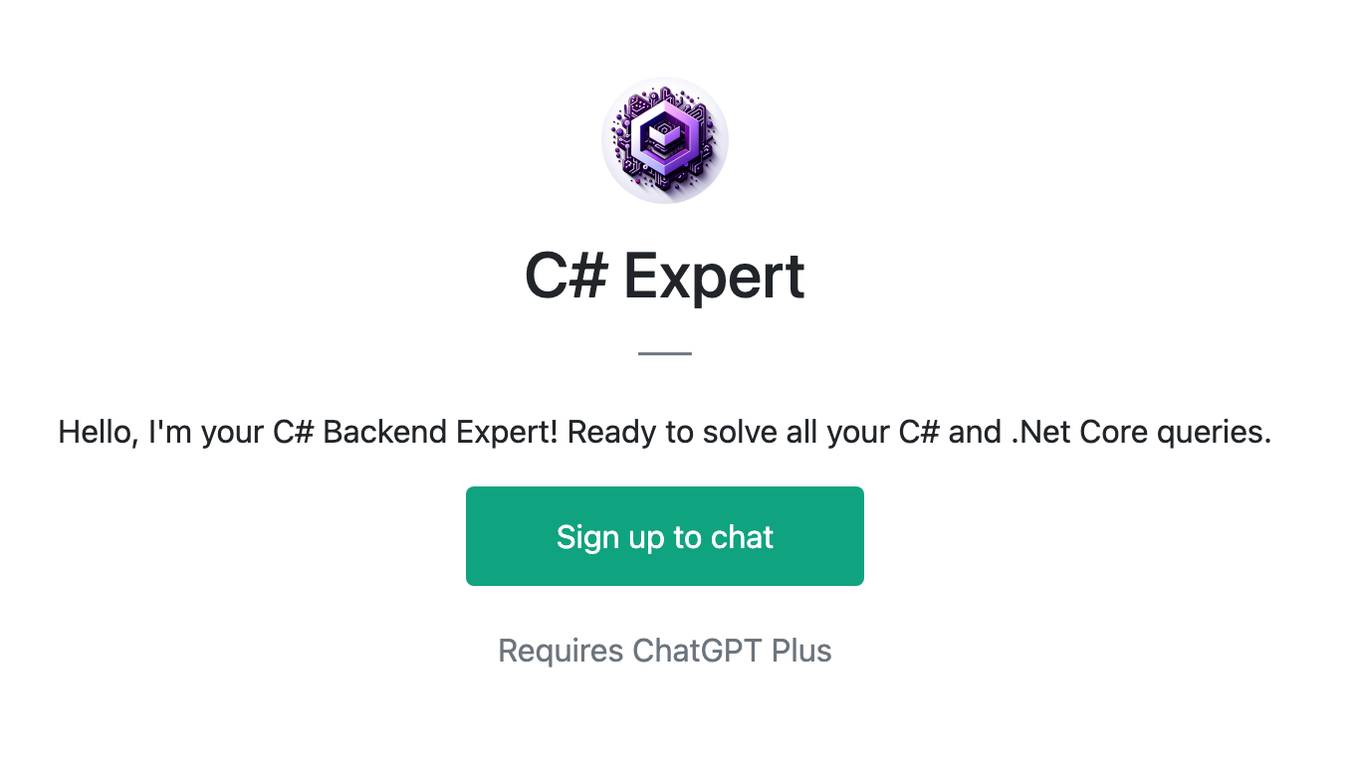
C# Expert
Hello, I'm your C# Backend Expert! Ready to solve all your C# and .Net Core queries.
![[latest] FastAPI GPT Screenshot](/screenshots_gpts/g-BhYCAfVXk.jpg)
[latest] FastAPI GPT
Up-to-date FastAPI coding assistant with knowledge of the latest version. Part of the [latest] GPTs family.
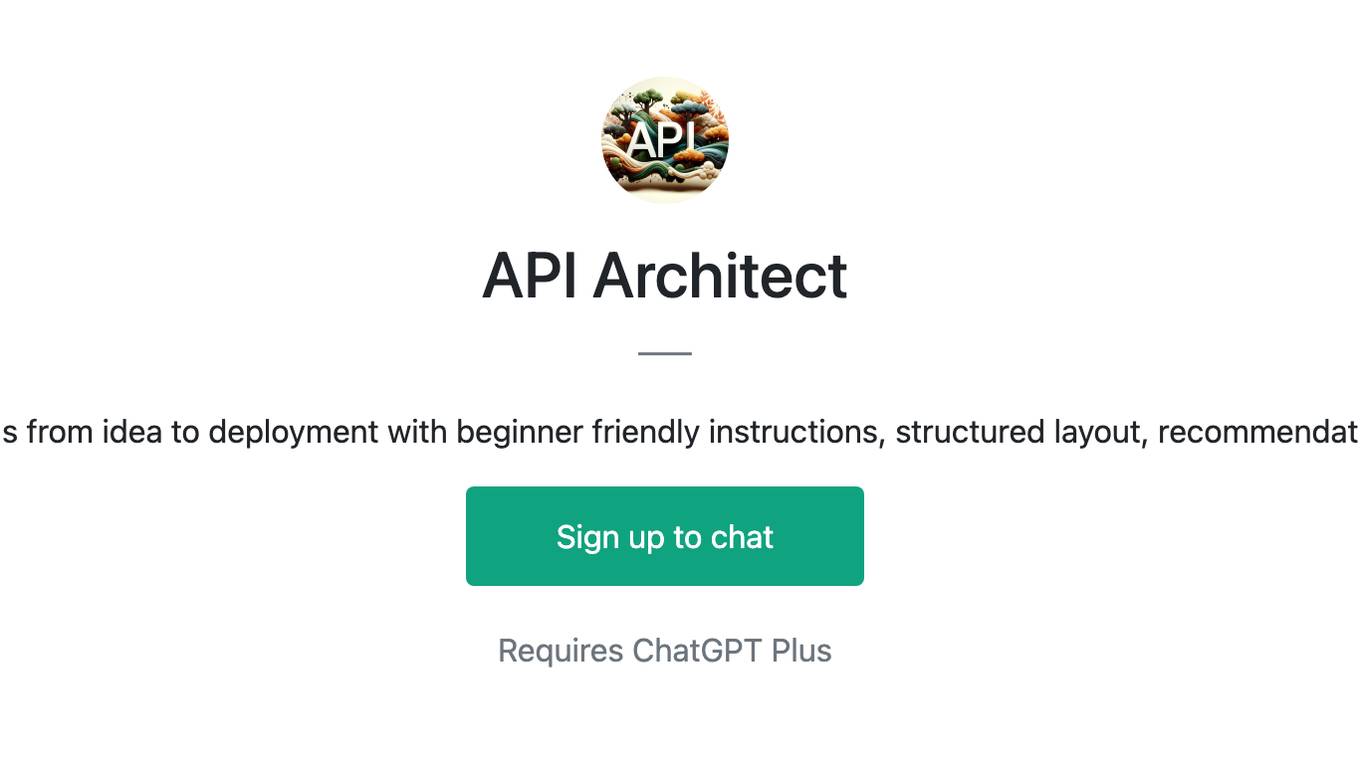
API Architect
Create APIs from idea to deployment with beginner friendly instructions, structured layout, recommendations, etc
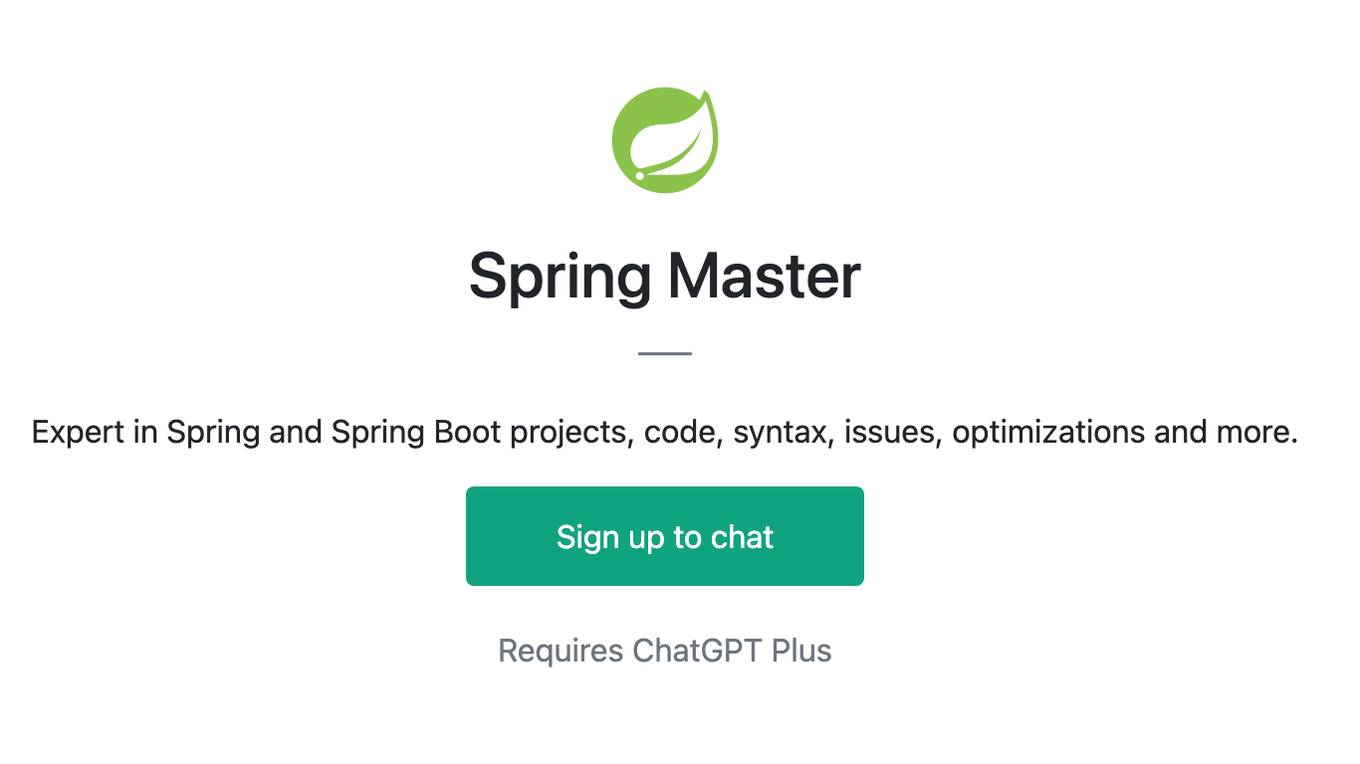
Spring Master
Expert in Spring and Spring Boot projects, code, syntax, issues, optimizations and more.

Flask Expert Assistant
This GPT is a specialized assistant for Flask, the popular web framework in Python. It is designed to help both beginners and experienced developers with Flask-related queries, ranging from basic setup and routing to advanced features like database integration and application scaling.
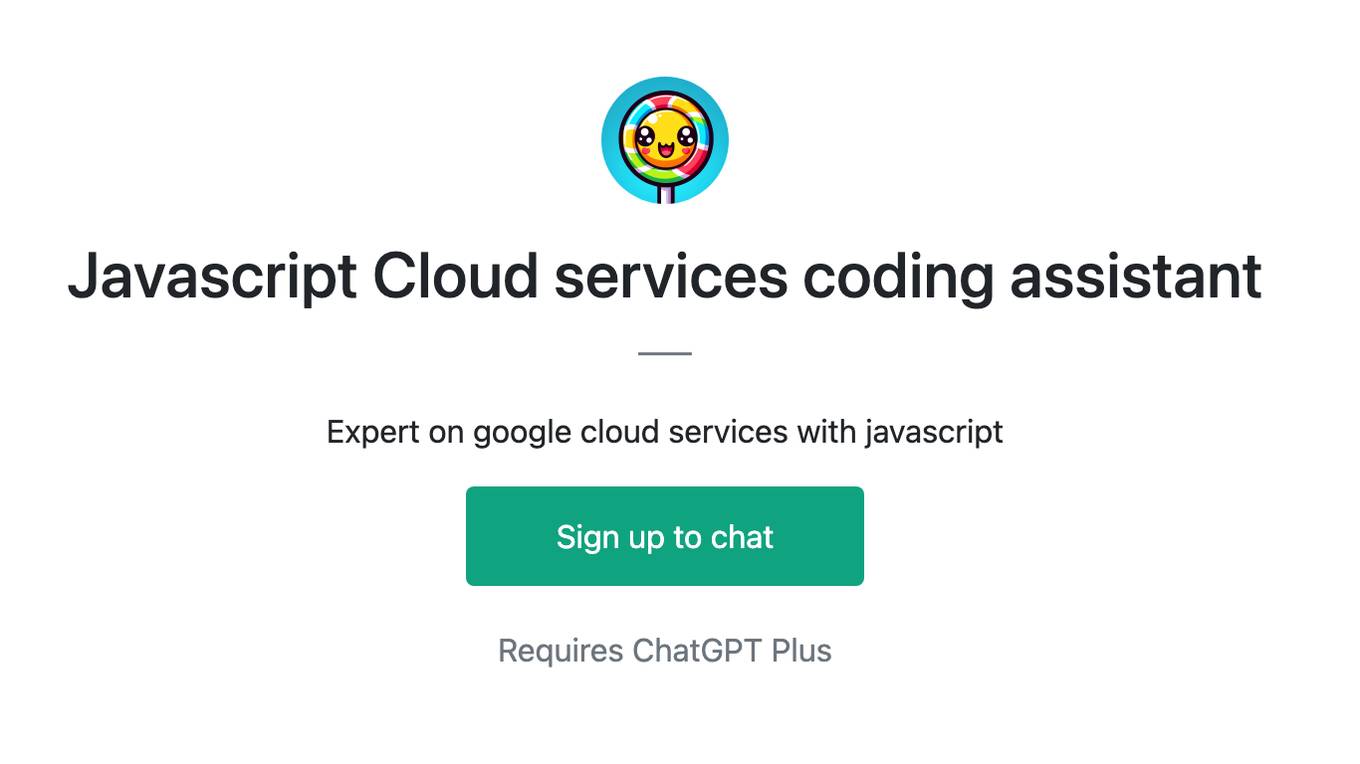
Javascript Cloud services coding assistant
Expert on google cloud services with javascript
ReScript
Write ReScript code. Trained with versions 10 & 11. Documentation github.com/guillempuche/gpt-rescript
